

Search Smartraveller
Australia's biosecurity and border controls.
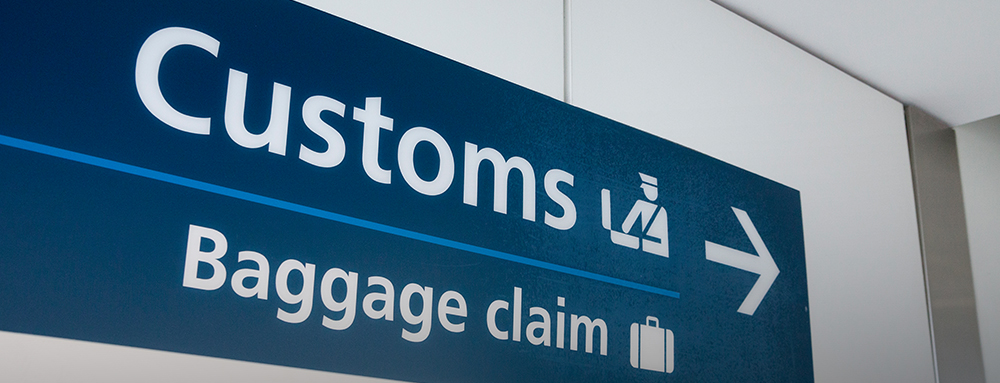
There is a current outbreak of foot and mouth disease (FMD) in Indonesia. Increased biosecurity measures are in place in Australian airports to prevent the disease spreading across our borders. For more information, visit the Department of Agriculture, Forestry and Fisheries .
The Australian government controls the movement of people and goods across our border. This is to protect Australia's environment, economy, health and wellbeing, and security.
To avoid issues, penalties and fines, and to reduce the risk of experiencing delays when you return to Australia, consider:
- any COVID-19 requirements you may have to meet , including for transit destinations
- the documents you need to pass through Australian immigration
- any biosecurity restrictions and requirements
- any import requirements .
COVID-19 requirements
Destinations, transport providers and transit locations may have their own rules for testing (including pre-departure), masking and vaccination. Before arriving at check-in:
- check the local rules of each destination and transit location you're passing through
- confirm any requirements with your airline, cruise line or travel provider
- read our global health advisory and step-by-step guide to travel during COVID-19 for more information.
More information:
- G lobal COVID-19 health advisory
Documents, passport and SmartGate
All travellers returning to Australia must have a:
- valid passport
- completed Incoming Passenger Card (IPC).
You can use SmartGate when arriving at Australian international airports if you:
- hold an Australian or New Zealand ePassport
- are aged 16 or older.
All Australian passports are ePassports. An ePassport contains electronic information that helps to confirm your identity.
SmartGate uses ePassport data and facial recognition technology to let you go through passport control by yourself. It is quick and secure, meaning you may leave the airport faster.
Biosecurity
Australia has strict biosecurity controls to help minimise the risk of pests and diseases entering the country. All travellers must meet the requirements before entering Australia.
You must declare certain food, plant material and animal products on your Incoming Passenger Card (IPC). An IPC is a document that identifies and records a person's entry into Australia. It's where you declare goods for custom and quarantine inspection.
If you declare goods on your IPC, go to an inspection point on arrival. A biosecurity officer will assess them.
If you don't want to declare goods, dispose of them in the bins at the terminal before the inspection points.
You could be fined or prosecuted for carrying undeclared controlled goods.
Officers screen your luggage using:
- detector dogs
- x-ray machines and/or
- baggage inspection.
In many cases, they'll return your declared goods to you after inspection. Some items may need treatment to make them safe. Some items are not allowed into Australia because of the risk of pests and disease. Officers may seize these for export or destruction.
Before travelling, check if you can bring your items back to Australia .
Check detailed import conditions on the Biosecurity Import Conditions system (BICON) website.
Importing goods
The Australian Border Force regulates which goods you can and can't bring in and whether you'll need a permit.
Restricted items
You must declare these restricted or prohibited items upon arriving in Australia:
- firearms, weapons and ammunition
- agricultural and veterinary chemical products
- pornography and objectionable material
- heritage-listed goods, such as works of art, stamps, coins, archaeological objects and specimens
- defence and strategic goods.
Medicines, drugs and herbal remedies
You need to declare all medicine, including:
- prescription medications
- alternative and herbal medicines
- vitamins and mineral preparation formulas
- performance- and image-enhancing drugs
- veterinary medicines.
If you’re carrying AUD10,000 or more (or foreign currency equivalent) worth of cash, cheque, traveller’s cheque or money order, you must declare it at the border. Fill out the form on AUSTRAC’s website and download a copy of the submission receipt to show if requested.
Wildlife, plants and animals
You must declare wildlife products on arrival in Australia. Some may also require a permit.
If you buy wildlife products overseas, find out if you need a permit before bringing them home with you. If you don't have the correct permit, authorities will seize your product. Penalties or fines may apply.
'Wildlife' includes any whole, part or derivative of a plant or animal, living or non-living. Examples include:
- protected wildlife, such as coral, orchids, caviar and hunting trophies
- wood and seeds
- ivory and products made from ivory
- leather or fur
- traditional medicines containing animal organs, teeth or body parts
- live plants
- fresh or dried flowers.
- the Department of Agriculture's advice on bringing items back to Australia
- the Department of Agriculture's alert regarding foot-and-mouth disease
- the Australian Border Force guidance on returning to Australia through quarantine
- the Department of the Environment and Energy's information for travellers returning to Australia
- the Therapeutic Goods Administration website for information about bringing medicines and medical products into Australia
- the Australian Pesticides and Veterinary Medicines Authority website for information on regulations of the veterinary pharmaceuticals you can and can't bring into Australia.
Related content
This page explains our travel advisories for destinations, how we develop and update our travel advisories and what each advice level means in travel advisories.
The Australian Government can provide some notarial services. The services we provide depends if requested in Australia or overseas. We charge fees for our service.
Foreign authorities may request a document to be issued with an Apostille or an Authentication certificate before they will accept it. This is called ‘legalisation’.
- KAYAK for Business NEW
Indonesia Travel Restrictions
Traveller's COVID-19 vaccination status
Travelling from Australia to Indonesia
Open for vaccinated visitors
COVID-19 testing
Not required
Not required for vaccinated visitors
Restaurants
Not required in public spaces and enclosed environments.
Documents & Additional resources
Ready to travel, find flights to indonesia, find stays in indonesia, explore more countries on travel restrictions map, destinations you can travel to now, netherlands, new zealand, philippines, south korea, united arab emirates, united kingdom, united states, know when to go.
Sign up for email alerts as countries begin to open - choose the destinations you're interested in so you're in the know.
Can I travel to Indonesia from Australia?
Most visitors from Australia, regardless of vaccination status, can enter Indonesia.
Can I travel to Indonesia if I am vaccinated?
Fully vaccinated visitors from Australia can enter Indonesia without restrictions.
Can I travel to Indonesia without being vaccinated?
Unvaccinated visitors from Australia can enter Indonesia without restrictions.
Do I need a COVID test to enter Indonesia?
Visitors from Australia are not required to present a negative COVID-19 PCR test or antigen result upon entering Indonesia.
Can I travel to Indonesia without quarantine?
Travellers from Australia are not required to quarantine.
Do I need to wear a mask in Indonesia?
Mask usage in Indonesia is not required in public spaces and enclosed environments.
Are the restaurants and bars open in Indonesia?
Restaurants in Indonesia are open. Bars in Indonesia are .
- Hotline: +6221-50919500
- Contact Our Sales Team: +62 812-8118-9105
- Email: [email protected]

Blog – InvestinAsia
The Market Entry Experts Indonesia
Travel to Indonesia from Australia: Your Ultimate Guide
- InvestinAsia Team
- November 20, 2023

Are you an adventurous soul looking to explore the stunning archipelago of Indonesia from the land down under, Australia? You’re in for a treat! Indonesia is a tropical paradise renowned for its lush landscapes, rich culture, and warm hospitality.
In this comprehensive guide, we will take you through every aspect of planning your trip to Indonesia from Australia, ensuring a seamless and memorable journey.
Also read: Indonesia Travel Guide: Explore the Beautiful Archipelago
Can Australians Travel to Indonesia?

Yes, Australians can easily travel to Indonesia. There are no travel restrictions in place for Australians traveling to Indonesia. Whether you’re considering travel to Indonesia from Australia or just entering Indonesia from Australia, this guide has got you covered. However, you are advised to check the latest travel advice from the Australian government before you travel.
Also read: Travel to Bali from Australia: A Complete Guide
Preparing for Your Indonesian Adventure
Research and planning.
Before embarking on any international trip, meticulous planning is essential. Start by researching the diverse destinations Indonesia has to offer and decide which ones align with your interests and preferences, making your travel to Indonesia from Australia truly personalized. Indonesia boasts a myriad of options, from the vibrant streets of Bali to the pristine beaches of Lombok.
Also read: Indonesia Visa for Australian Citizens: A Complete Guide
Visa and Passport Requirements
Australian citizens and permanent residents are eligible for a visa on arrival (VOA) for stays of up to 30 days, simplifying the process of entering Indonesia from Australia. Visa on Arrival Indonesia can be obtained at Indonesian airports, but it is advisable to apply for an e-VOA in advance, which can be done online.
If you are planning to stay in Indonesia for longer than 30 days, you will need to apply for a visa at an Indonesian embassy or consulate in Australia, fulfilling the Indonesia entry requirements from Australia.
However, if you are looking for assistance with the Indonesia visa application process, you can rely to InvestinAsia’s visa services.
Our team of experts can assist you with:
- Indonesia business visa application
- Indonesia tourist visa application
- Indonesia work visa / KITAS application
- Indonesia investor visa / KITAS application
- Indonesia spouse visa application
- Indonesia dependent visa application
- Visa on Arrival extension in Indonesia
- Indonesia KITAP application
Chat with us now for a FREE consultation and receive a special offer!
In addition to a visa and passport, there are other entry requirements for traveling to Indonesia from Australia:
Proof of onward travel
You must have a confirmed onward or return ticket to show your immigration officer.
Proof of accommodation
You must have proof of accommodation, such as a hotel booking or a letter of invitation from a friend or family member.
Sufficient funds
You must have sufficient funds to support yourself during your stay in Indonesia. The recommended amount is IDR 2,500,000 (approximately AUD 250) per day.
Health requirements
You are no longer required to show proof of vaccination or a negative PCR test to enter Indonesia. However, you may be required to complete a health declaration form upon arrival.
Please note that these entry requirements are subject to change at short notice. It is always best to check with the Indonesian Embassy or Consulate in Australia for the latest information before you travel.
Also read: Indonesia Tourist Visa for Australian Citizens: A Complete Guide
How to travel to Indonesia from Australia
When it comes to travel to Indonesia from Australia, there are convenient options. There are direct flights to Indonesia from several Australian cities, including Sydney, Melbourne, Brisbane, and Perth. The flight time to Bali is approximately 7 hours from Sydney and Melbourne, and 9 hours from Brisbane and Perth.
Indonesia has several international airports, but the primary entry points for Australian travelers are Ngurah Rai International Airport in Bali, Soekarno-Hatta International Airport in Jakarta, and Juanda International Airport in Surabaya. Select the airport that best suits your itinerary, making your journey from Australia to Indonesia smooth and hassle-free.
For those seeking an alternative way of travelling to Indonesia from Australia, there are also ferry services available. The ferry journey from Darwin to Bali takes approximately 24 hours, providing a unique and adventurous experience for those who prefer sea travel when entering Indonesia from Australia.
Safety and Travel Tips
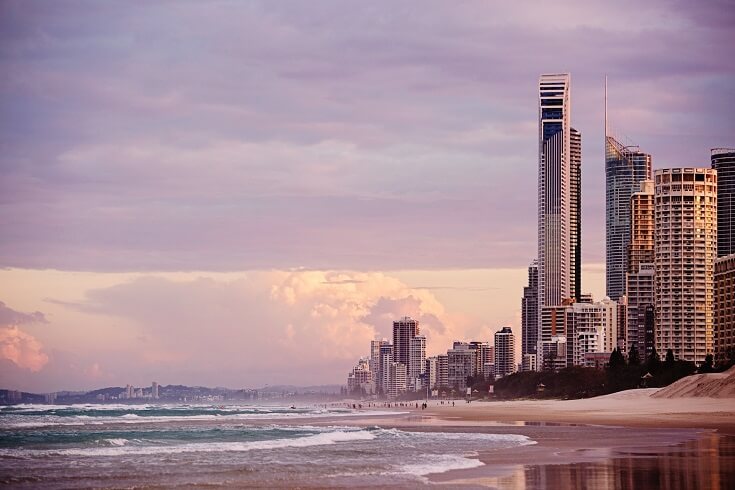
Safety Precautions
While Indonesia is generally a safe destination for travelers, it’s essential to stay vigilant and take precautions during your travel to Indonesia from Australia. Secure your belongings, be cautious of scams, and avoid risky areas, especially at night.
Communication
Having a local SIM card with data is invaluable for staying connected and navigating around during your travelling to Indonesia from Australia. English is widely spoken in tourist areas, but learning a few basic Bahasa Indonesia phrases can enhance your travel experience, ensuring a smoother transition when entering Indonesia from Australia.
Also read: Bali Visa for Australian Citizens: A Complete Guide
In summary, traveling to Indonesia from Australia is a thrilling adventure waiting to unfold. With careful planning and an open heart, you can explore the beauty and diversity of this enchanting nation, meeting all the Indonesia entry requirements from Australia. So pack your bags, immerse yourself in Indonesian culture, and create memories that will last a lifetime.
If you have any further questions, please feel free to chat with us!

if you are ready to start your life in indonesia or to think of discusing other options.

Talk to Our Consultants
Related Posts
Bali Entertainment Visa/KITAS: A Complete Guide
How to Apply for Indonesia Retirement Visa: A Complete Guide
7 Reasons Why You Might Be Denied Entry at an Airport
Business Visa Bali: 2024 Complete Guide
- SIMCards / eSIMS
Staying in Bali for more than just a holiday
- Animal Welfare
- Green Traveling

Hotels, Resorts, Villas & Holiday Rentals

Bali's no. 1 Travel Guide
Don't Forget:
Things to Do in Bali
With our BaliCard, Bali's Digital Discount Card & Tourist Pass, you save 10% and more
What's on Bali

Events at W Bali Seminyak

Events at Desa Potato Head

Events at AYANA Bali

Events at MRS SIPPY
Bali Visa Requirements for Australian Travelers
Indonesia visa for australians (au).
Entering Bali / Indonesia with a Passport from Australia
What are the Visa Regulations for Australians to visit Bali / Indonesia?
Your length of stay in bali will determine what type of visa for indonesia (tourist visa | holiday visa) applies to you .
Note: Following regulations apply to travelers who hold an Australian passport. An Australian residency is not enough. Visas are generally granted based on your citizenship / passport.
With an Australian passport you can choose between following Visa Types:
Bali visa requirements for indonesia for nationalities eligible for a visa on arrival - with travel purpose tourism, social visit, meetings, if you stay less than 60 days you need a visa on arrival, which can be purchased online:.
Important: Make sure your passport is valid at least 6 months from the day of entry. No exceptions. See Passport Requirements
A. If you stay less than 30 days in Indonesia
- Visit Visa (also known as Visa on Arrival . (Info, Costs, Application Link, FAQ)
B. If you stay between 30 or 60 Days in Indonesia
- Visit Visa ( Visa on Arrival) but needs to be extended once for 30 days. (Info, Prices, FAQ)
- or, you can get a 211A Visa, valid for 60 days (Info, Prices, FAQ, Online Application Service, Requirements)
C. If you stay more than 60 Days in Indonesia
- 211A Visa, valid for 60 days, can be extended twice while in Indonesia for 60 days each (Info, Prices, FAQ, Online Application).
If you are looking for a long stay Visa, Temporary Resident Permit, KITAS, Remote worker Visa etc, have a look at our Indonesia Visa Overview
Important Tips for your Bali Trip
Pay the new bali tourist tax, get an airport transfer, fill in the custom form before arrival, secure awesome discounts on villas, activities & more, get your international driving license, more essential tips, get your bali simcard before you arrive, book your hotel, villa, resort, where to stay in bali, bali weather & seasons, plugs, sockets, voltage.
- Complete Travel Guide
Visa on Arrival / Visit Visa Information
- How much does the Visitor Visa / Visa on Arrival (VoA) Cost - what are the Visa fees?
- How long is the Visa on Arrival valid?
- Where can I get the Visa on Arrival, Tourist Visa?
Please find all UPDATED information about the Visit Visa / Visa on Arrival here:
Book & Purchase your Bali Essentials Online
Discount Card & Tourist Pass
Hotels, Villas & Resorts
Intern. Driving License
Bali SIMcard & eSIM Cards
Car Rental with Driver & Tours
Private Airport Transfer

Guided Tours & Sightseeing
Scooters & Motorbike Rental
Medical Travel Insurance
Flights to Bali & Beyond
- Visa & Entry Regulations
- Bali Tourist Tax
- Bali DISCOUNT Card
- Hotels, Resorts, Villas
- Buy SIMCards & eSim
- Int. Driving License (mandatory)
- Airport Shuttle
- Scooter & Bike Rental
- Car Rental & Driver
- Reliable Medical Insurance
- Destinations | Where to Stay
- Going Out & Nightlife
- Weather & Seasons
- Weddings & Getting Married
- Things to Do
- What’s-On Calendar
- Events @ W Bali
- Events @ Potato Head
- Events @ Rock Bar
- Living in Bali
No products in the cart.
Return to shop
Username or email address *
Password *
Remember me Log in
Change Location
Find awesome listings near you.
Update April 12, 2024
Information for u.s. citizens in the middle east.
- Travel Advisories |
- Contact Us |
- MyTravelGov |
Find U.S. Embassies & Consulates
Travel.state.gov, congressional liaison, special issuance agency, u.s. passports, international travel, intercountry adoption, international parental child abduction, records and authentications, popular links, travel advisories, mytravelgov, stay connected, legal resources, legal information, info for u.s. law enforcement, replace or certify documents.
Before You Go
Learn About Your Destination
While Abroad
Emergencies
Share this page:
Travel Advisory July 24, 2023
Indonesia - level 2: exercise increased caution.
Reissued with obsolete COVID-19 page links removed.
Exercise increased caution in Indonesia due to terrorism and natural disasters. Some areas have increased risk. Read the entire Travel Advisory.
Do Not travel to:
- The provinces of Central Papua (Papua Tengah) and Highland Papua (Papua Pegunungan) due to civil unrest.
Terrorists continue plotting possible attacks in Indonesia. Terrorists may attack with little or no warning, targeting police stations, places of worship, hotels, bars, nightclubs, markets/shopping malls, and restaurants.
Natural disasters such as earthquakes, tsunamis or volcanic eruptions may result in disruptions to transportation, infrastructure, sanitation, and the availability of health services.
Demonstrations occur frequently and have the potential to become violent. Avoid demonstrations and crowds.
Indonesia’s revised criminal code, which takes effect January 2026, includes penalties for defamation, blasphemy, cohabitation, and sex outside of marriage. It is unclear how Indonesian authorities will implement the revised criminal code.
Read the country information page for additional information on travel to Indonesia.
If you decide to travel to Indonesia:
- Monitor local media for breaking events and be prepared to adjust your plans.
- Visit the websites for Badan Geologi (Indonesian Geological Agency, Indonesian language only) for the latest information from the Government of Indonesia on current natural disasters.
- Review the CDC’s suggestions on how to prepare for natural disasters.
- Be aware of your personal safety and security at all times.
- Enroll in the Smart Traveler Enrollment Program ( STEP ) to receive alerts and make it easier to locate you in an emergency.
- Ensure your passport is valid for at least six months beyond your intended stay.
- Follow the Department of State Facebook and Twitter . Follow the U.S. Embassy Jakarta on Facebook , Instagram , and Twitter .
- Review the Country Security Report for Indonesia.
- Prepare a contingency plan for emergency situations. Review the Traveler’s Checklist .
Central Papua and Highland Papua– Level 4: Do Not Travel
In Central Papua and Highland Papua, violent demonstrations and conflict could result in injury or death to U.S. citizens. Avoid demonstrations and crowds. Armed separatists may kidnap foreign nationals.
The U.S. government has limited ability to provide emergency services to U.S. citizens in Central Papua and Highland Papua as U.S. government employees must obtain special authorization before traveling to those areas.
Embassy Messages
View Alerts and Messages Archive
Quick Facts
Six months beyond arrival date. Indonesia does not accept the 12-page U.S. emergency passport for entry into Indonesia.
Two blank visa pages required for entry stamp
Yes, Visa or Visa on Arrival
100,000,000 Indonesian rupia (approx. $7,000 USD)
Embassies and Consulates
U.s. embassy jakarta.
Jl. Medan Merdeka Selatan No. 3 - 5 Jakarta 10110, Indonesia Telephone: +(62)(21) 5083-1000 Emergency After-Hours Telephone: +(62)(21) 5083-1000 ext. 0 (operator) Email: [email protected]
U.S. Consulate General Surabaya Jl. Citra Raya Niaga No. 2 Surabaya 60217 Indonesia Telephone: +(62)(31) 297-5300 Emergency After-Hours Telephone: +(62)(811) 334-183 Email: [email protected]
U.S. Consular Agency Bali Jalan Hayam Wuruk 310, Denpasar, Bali Telephone: +(62)(361) 233-605 Emergency After-Hours Telephone: Please contact the U.S. Consulate in Surabaya:+(62)(811) 334-183 Email: [email protected]
American Consulate Medan, Sumatra Uni Plaza Building 4th Floor (West Tower) Jl. Let. Jend. MT Haryono A-1 Medan 20231, Indonesia Telephone: +(62)(61) 451-9000 Emergency After-Hours Telephone: +(62)(61) 451-9000 Email: [email protected]
The U.S. Consulate in Medan provides only emergency assistance to U.S. citizens and does not offer routine consular services.
Destination Description
See the Department of State’s Fact Sheet on Indonesia for information on U.S.- Indonesia relations.
Entry, Exit and Visa Requirements
Entry Requirements: To enter Indonesia, your passport must have at least two blank pages and be valid for at least six months beyond the date of your arrival in Indonesia. If your passport does not meet these requirements, you will be denied entry into Indonesia. The Government of Indonesia will not admit travelers holding the 12-page U.S. emergency passport, issued by U.S. embassies and consulates overseas.
Visa-on-Arrival: If you meet the requirements, you can apply for a visa on arrival at some international airports, seaports, or land crossings. To apply for the visa on arrival, you must have an ordinary (non-emergency) passport with at least 6 months of validity from the date you plan to enter and the date you plan to leave Indonesia and a return or onward flight booking to another country. There is a 500,000 Indonesian Rupiah fee (about $35). The visa on arrival is valid for up to 30 days. You may extend a Visa-on-Arrival once at the immigration office one week before it expires for an additional 30 days for a maximum of 30 additional days, for another 500,000 Rupiah.
- Official visit or government duties;
- Business meeting;
- Procurement of goods;
- Official meeting; or
Electronic Visa-On-Arrival: You may also apply for an electronic Visa on Arrival (e-VOA) in advance if you are entering Indonesia at Soekarno-Hatta International Airport in Jakarta or Ngurah Rai International Airport in Bali. Check the e-VOA requirements from Indonesian Immigration before applying. To apply for an e-VOA see https://molina.imigrasi.go.id/ .
Visa: Travel for more than 30 days and travel for non-VOA purposes, including employment and journalism, requires that the appropriate visa be obtained from an Indonesian embassy or consulate before arrival. If you are traveling on an emergency passport, you must obtain a visa before arrival in Indonesia.
If you overstay your visa, you are subject to a fine of 1 million Indonesian rupiah (about $70 USD at current exchange rates; fees may change at any time) per day and may be detained and deported. U.S. citizens have been jailed for visa overstays or entering the country on the wrong visa class for their purpose of travel . Travelers coming to Indonesia for non-tourism purposes are strongly encouraged to consult Indonesian Immigration’s website. Travelers should generally carry a copy of their passport with them whenever possible to establish their identity and proof of Indonesian visa.
You must exit Indonesia using the same passport that you used to enter. If this passport is replaced for any reason before you depart Indonesia, you must apply with Immigration to obtain a “special pass” (exit permit) in your new passport prior to departing.
Dual-Nationality: Indonesia has laws that prohibit Indonesian citizens from holding additional nationalities. If you are an Indonesian with dual nationality, you could be compelled to renounce your Indonesian nationality through a formal act of renunciation. Please research Indonesian nationality laws and consult with a local attorney regarding any specific circumstance.
The U.S. Department of State is unaware of any HIV/AIDS entry restrictions for visitors to or foreign residents of Indonesia. The Government of Indonesia screens incoming passengers in response to reported outbreaks of pandemic illnesses.
Find information on dual nationality , prevention of international child abduction , and customs regulations on our websites.
Safety and Security
Terrorism: Terrorist groups and those inspired by such organizations are intent on attacking U.S. citizens abroad. Terrorists are increasingly using less sophisticated methods of attack – including knives, firearms, and vehicles – to target crowds. Frequently, their aim is unprotected or vulnerable targets, such as:
- High-profile public events (sporting contests, political rallies, demonstrations, holiday events, celebratory gatherings, etc.)
- Hotels, clubs, and restaurants frequented by tourists
- Places of worship
- Shopping malls and markets
- Public transportation systems (including subways, buses, trains, and scheduled commercial flights)
Extremists in Indonesia aspire to carry out violent attacks against Indonesian and foreign targets, and police have arrested more than 1,200 individuals on terrorism-related charges since 2018. Extremists may target both official and private establishments, including government offices, hotels, bars, nightclubs, shopping areas, restaurants, and places of worship. Be aware of your personal safety and security at all times.
Recent incidents of extremist violence include a December 2022 suicide bombing at a police station in Bandung, West Java that killed one police officer, a March 2021 bomb attack against a church in Makassar, South Sulawesi which injured 20 civilians, and May 2018 bomb attacks against three churches in Surabaya, East Java which killed 15 civilians and injured 50.
Demonstrations are very common in Jakarta, Surabaya, and other large cities, but less common in Bali. You should avoid demonstrations and other mass gatherings, since even those intended to be peaceful can become violent. U.S. citizens have been detained for participating in protests. Demonstrations may become more frequent ahead of the Indonesian general elections scheduled for February 2024.
Currently, travel by U.S. government personnel to the provinces of Central Papua (Papua Tengah) and Highland Papua (Papua Pegunungan) is restricted to mission-essential travel that is approved in advance by the Embassy. Papuan separatists have kidnapped foreigners in the past and a New Zealand national was kidnapped by a separatist group in Nduga Regency in February 2023.
For more information, see our Terrorism page.
Crime: In the last year several American citizens were victims of violent and serious crimes in Indonesia, particularly in Bali. As with any major tourist destination, U.S. citizens traveling in Indonesia are especially encouraged to always remain vigilant of their surroundings and read the following advisories carefully. Take sensible measures to protect yourself and your belongings. Closely monitor bags and luggage and carry only essential items. Take particular care of your passport and bank cards and avoid traveling alone.
Police presence and responsiveness is less than it is in the United States, making it more difficult to report crimes quickly and receive police attention. U.S. citizens often cite language barriers as a major hindrance when reporting crimes.
Pickpocketing, sexual assault, vehicle theft, armed car-jacking, snatch and grab robberies of cell phones and purses, and residential break-ins are common. Avoid traveling to isolated areas late at night. Be aware of your surroundings, particularly vehicles or individuals that might be following you.
Use a reputable taxi company or hire a taxi either at a major hotel or shopping center and ensure the driver’s identity card is visible. If you are booking a car via a mobile app, always ensure that the driver is the same as the person on the app, share your journey with a friend via the in-app option, and know the contact information for the app’s security center. Be aware of drivers falsely claiming to be registered with online ride hailing apps.
Credit card fraud is a common problem in Indonesia. Criminals have “skimmed” credit/debit cards to access and drain bank accounts. Use an ATM in a secure location, such as a major bank branch, and check the machine for evidence of tampering. Monitor your account statements regularly.
Tourists and Indonesians have suffered from serious illness and have even died from "drink-spiking” and drink poisoning incidents, particularly in clubs and nightspots in urban and tourist areas. There have been reports of sexual assaults and drink spiking in Bali, Lombok, and the Gili Islands. Make sure drinks are prepared in your sight and be careful about accepting drinks from strangers at clubs and parties or leaving drinks unattended. Tourists have also been robbed after taking visitors to their hotel rooms, and in some cases have found that their drinks were spiked. There have also been deaths and serious illnesses caused by drinking alcoholic drinks contaminated with methanol. These cases have occurred in bars, shops, and hotels in popular tourist areas like Bali, Lombok, the Gili Islands, and Sumatra.
Sexual Assault: Women travelling alone may be subject to harassment and verbal abuse. Sexual assault, harassment, and rape occur. To minimize the risk, avoid travelling alone, especially at night; remain particularly vigilant in less populous areas; and be careful when dealing with strangers or recent acquaintances. Never leave food or drinks unattended or in the care of strangers. Be wary of accepting snacks, beverages, gum, or cigarettes from new acquaintances. These items may contain drugs that could put you at risk of sexual assault and robbery. Local authorities may not respond adequately to reports of sexual violence and harassment. If you are the victim of a sexual assault, you should report it immediately to local authorities and to the U.S. Embassy or U.S. Consulate General.
Demonstrations occur frequently. They may take place in response to political or economic issues, on politically significant holidays, and during international events.
- Demonstrations can be unpredictable. Avoid areas around protests and demonstrations.
- Past demonstrations have turned violent.
- Check local media for updates and traffic advisories.
- Participating in demonstrations on a tourist visa can lead to deportation.
International Financial Scams: See the Department of State and the FBI pages for information.
Internet romance and financial scams occur in Indonesia. Scams are often initiated through Internet postings/profiles or by unsolicited emails and letters. Scammers almost always pose as U.S. citizens who have no one else to turn to for help. Common scams include:
- Romance/Online dating
- Money transfers
- Lucrative sales
- Gold purchase
- Contracts with promises of large commissions
- Grandparent/Relative targeting
- Free Trip/Luggage
- Inheritance notices
- Work permits/job offers
- Bank overpayments
Victims of Crime:
Sexual assault: U.S. citizen victims of sexual assault should seek prompt medical assistance, contact the Embassy or nearest Consulate, and call the local police at 112. For a criminal investigation to be initiated by the police, the victim must make a full statement to the local police, in person. Remember that local authorities are responsible for investigating and prosecuting crime. U.S. citizen victims of sexual assault may choose to be accompanied by a translator.
See our webpage on help for U.S. victims of crime overseas .
- Help you find appropriate medical care
- Assist you in reporting a crime to the police
- Contact relatives or friends with your written consent
- Explain the local criminal justice process in general terms
- Provide a list of local attorneys
- Provide our information on victim’s compensation programs in the U.S.
- Provide an emergency loan for repatriation to the United States and/or limited medical support in cases of destitution. Follow this link for more information
- Help you find accommodation and arrange flights home
- Replace a stolen or lost passport
Domestic Violence: U.S. citizen victims of domestic violence are encouraged to contact the Embassy for assistance.
Tourism: The tourism and recreational activity industries are unevenly regulated, and safety inspections for equipment and facilities do not commonly occur. Hazardous areas/activities are not always identified with appropriate signage, and staff may not be trained or certified either by the host government or by recognized authorities in the field. Water sports, especially diving, can be hazardous in Indonesia with operators lightly regulated and hyperbaric chambers available only in Bali and Ambon. Traffic is hazardous in Indonesia and U.S. citizens are frequently injured while riding rented motorbikes. Wearing a helmet is required by law. In the event of an injury, appropriate medical treatment is typically available only in/near major cities, and only basic stabilization may be available. Serious injuries require medical evacuation to another country. First responders are generally unable to provide urgent medical treatment or to access areas outside of major cities. Boat and ferry incidents are frequent; vessels rarely carry appropriate sizes and numbers of safety vests; passengers are encouraged to bring their own. U.S. citizens are strongly encouraged to purchase medical evacuation insurance. See our webpage for more information on insurance providers for overseas coverage ( http://travel.state.gov/content/passports/en/go/health/insurance-providers.html ).
Please note: The U.S. Embassy and Consulates do not pay the medical expenses of private U.S. citizens in Indonesia. It is the traveler’s responsibility to ensure adequate medical insurance coverage or funds for medical expenses.
Local Laws & Special Circumstances
Criminal Penalties: You are subject to Indonesian laws. If you violate local laws, even unknowingly, you may be expelled, arrested, or imprisoned. Criminal cases can take months or even years to resolve, and suspects can be held without charges for up to 60 days, and in many cases longer. Indonesia‘s revised criminal code, which takes effect January 2026, includes penalties for defamation, blasphemy, cohabitation, and sex outside of marriage. Enroll in the Smart Traveler Enrollment Program (STEP) to stay up-to-date.
If you are convicted of possession, use, or trafficking of illegal drugs in Indonesia, you may be subject to heavy fines, long jail sentences, and even the death penalty. Some prescription medications that are available in the United States are illegal in Indonesia. Some drugs used to treat attention deficit hyperactivity disorder (ADHD) are illegal in Indonesia. Marijuana, Cannabis, hash, “edibles,” and products containing CBD or THC remain illegal in Indonesia, including for medicinal purposes. A medical prescription does not make it legal. If you take such products to Indonesia or purchase or use them in Indonesia, you can be arrested and face imprisonment, fines, deportation, or the death penalty. Illegal drug convictions often result in lengthy prison sentences, even at the simple possession level. Indonesian prison conditions are harsh and do not meet U.S. standards. Many prisons are overcrowded and provide minimal services. The costs of basic services, including healthcare, often must be borne by the prisoner.
Individuals establishing a business or practicing a profession that requires additional permits or licensing should seek information from the competent local authorities prior to practicing or operating a business.
Furthermore, some laws are also prosecutable in the United States regardless of local law. For examples, see our website on crimes against minors abroad and the Department of Justice website.
Arrest Notification: If you are arrested or detained, ask police or prison officials to notify the U.S. Embassy immediately. See our webpage for further information.
Counterfeit and Pirated Goods: Although counterfeit and pirated goods are prevalent in many countries, they may still be illegal according to local laws. You may also pay fines or have to give them up if you bring them back to the United States. See the U.S. Department of Justice website for more information.
Faith-Based Travelers: See the following webpages for details:
- Faith-Based Travel Information
- nternational Religious Freedom Report – see country reports
- Human Rights Report – see country reports
- Hajj Fact Sheet for Travelers
- Best Practices for Volunteering Abroad
LGBTQI+ Travelers: LGBTQI+ status or conduct is not illegal, but local authorities sometimes take legal action against, or tolerate harassment of people engaging in LGBTQI+ relationships or openly expressing LGBTQI+ identity. Some local governments have passed laws criminalizing LGBTQI+ relationships. Same-sex marriages or civil unions recognized as valid in other countries are not legally recognized in Indonesia. The Indonesian Parliament revised the criminal code to include penalties for cohabitation and sex outside of marriage. These revisions, however, will not come into force until January 2026, and how they will be implemented is unclear.
See our LGBTQI+ Travel Information page and section 6 of our Human Rights report for further details .
Sharia Law: Sharia law is enforced in Aceh province and may exist unofficially or through local legislation in other areas. The law is intended for Muslims and should not apply to non-Muslims or foreign visitors. You should be respectful of local traditions, mindful of social norms, and seek guidance from local police if confronted by Sharia authorities.
Earthquakes and Tsunamis: There are approximately 4,000 earthquakes per year in Indonesia, or more than 10 per day on average. While most earthquakes are mild, some cause significant destruction and can trigger tsunamis. Tsunami warning systems may not be operable, or reports of tremors and tsunamis may be delayed. Local construction standards are lower than in the United States, and many structures including hotels and malls are prone to damage or collapse in an earthquake. Access to disaster-affected areas is often difficult and assistance from the U.S. Embassy may be limited.
If a major earthquake or landslide occurs close to shore, you should follow the instructions of local authorities, bearing in mind that a tsunami could arrive within minutes. The Indonesia Tsunami Early Warning Centre issues tsunami warnings when a potential tsunami with significant impact is imminent or expected.
Volcanoes: There are 127 active volcanoes in Indonesia. Eruptions frequently cause travel delays, displace local populations, and disrupt economic activities.
Environmental Quality: Air quality in Indonesia’s major cities can range from "unhealthy for sensitive groups" to "unhealthy." Current air quality data for Jakarta can be found on the Embassy’s Air Quality page. Tap water is not potable throughout Indonesia and should not be consumed.
Mountain Hiking: When hiking in mountainous areas, obtain current information on local conditions, travel with a reputable guide, have overseas medical insurance, and carry a local mobile phone. Never go hiking or climbing alone. Particularly dangerous trails may not be clearly labeled as such. Hikers on Puncak Jaya in Papua should have realistic primary and backup plans for climbing down the mountain. Tour operators have abandoned climbers. Taking shortcuts through private property is considered trespassing and is not a safe or legal alternative to a proper plan. If possible, ensure your hiking plans are registered and known to local authorities and/or tourism operators, as this helps identify your presence in these areas in the event of an emergency.
Dual Nationality: Indonesian law does not recognize dual nationality for adults over 18 years of age. U.S. citizens who are also Indonesian nationals may be required to renounce their Indonesian citizenship and may also be deported. Please visit our Dual Nationality page .
Travelers with Disabilities: Persons with disabilities will face severe difficulties in Indonesia as most public places and transportation facilities do not accommodate disabled people. The law in Indonesia prohibits discrimination against persons with mental and physical disabilities, but the law is seldom enforced. Social acceptance of persons with disabilities in public is not as prevalent as in the United States. Expect accessibility to be extremely limited in public transportation, lodging, communication/information, and general infrastructure.
Students: See our Students Abroad page and FBI travel tips .
Women Travelers: Women traveling alone may be subject to harassment and verbal abuse. Sexual assault, harassment, and rape occur. To minimize the risk, avoid travelling alone, especially at night; remain particularly vigilant in less populous areas; and be careful when dealing with strangers or recent acquaintances. Never leave food or drinks unattended or in the care of strangers. Be wary of accepting snacks, beverages, gum, or cigarettes from new acquaintances. These items may contain drugs that could put you at risk of sexual assault and robbery. While domestic violence is illegal in Indonesia, these laws are rarely enforced. Local authorities may not respond adequately to reports of sexual violence and harassment. If you are the victim of a sexual assault, you should report it immediately to local authorities and to the U.S. Embassy or U.S. Consulate General and seek medical attention. See our travel tips for Women Travelers .
The Government of Indonesia requires all non-Indonesian citizens entering the country to be fully vaccinated against COVID-19.
Medical Care: For emergency services in Indonesia dial 112.
Sanitation and health care conditions in Indonesia are far below U.S. standards. Routine medical care is available in all major cities, although most expatriates leave the country for all but the most basic medical procedures. Physicians and hospitals often expect payment or sizable deposits before providing medical care, even in emergency and/or life-threatening situations. See our Embassy's website for a list of English-speaking doctors and hospitals, but keep in mind that even in large cities the quality of English-speaking medical personnel will vary and there are often communication difficulties. In remote areas there may be no English-speaking medical personnel. Psychological and psychiatric services are limited, even in the larger cities, with hospital-based care only available through government institutions.
Ambulance services are not widely available, and training and availability of emergency responders may be below U.S. standards. Ambulances are not staffed with trained paramedics and often have little or no medical equipment. Injured or seriously ill travelers may prefer to take a taxi or private vehicle to the nearest major hospital rather than wait for an ambulance.
We do not pay medical bills. Be aware that U.S. Medicare/Medicaid does not apply overseas. Most hospitals and doctors overseas do not accept U.S. health insurance.
Medical Insurance: Make sure your health insurance plan provides coverage overseas. Most care providers overseas only accept cash payments. See our webpage for more information on insurance providers for overseas coverage. Visit the U.S. Centers for Disease Control and Prevention for more information on type of insurance you should consider before you travel overseas.
We strongly recommend supplemental insurance to cover medical evacuation, which can exceed over $100,000 per person.
Always carry your prescription medication in original packaging, along with your doctor’s prescription. Be aware that Indonesian authorities may consider some prescription drugs as illegal narcotics. The Indonesian government does not publish a list of which pharmaceuticals are considered contraband, and these decisions may be arbitrary.
U.S. citizens are advised against mailing or shipping by courier any medications to Indonesia. Indonesian authorities pay close attention to packages containing pharmaceuticals and may detain or arrest recipients of both prescription and over the counter medications. Even if a medication is legal or has been prescribed in the United States, it may be considered an illegal narcotic in Indonesia. U.S. citizens are advised to only hand carry prescription medications into the country, in the original packaging with a copy of any prescription. The U.S. Embassy and Consulates cannot assist you with the importation and/or release of medications.
Marijuana, Cannabis, hash, “edibles,” and products containing CBD or THC remain illegal in Indonesia, including for medicinal purposes. A medical prescription does not make it legal.
Local pharmacies carry a range of products of variable quality, availability, and cost. Counterfeit pharmaceuticals are a significant risk; patronize only reputable pharmacies. Malaria, dengue, Japanese encephalitis, and Zika virus are mosquito borne diseases in Indonesia. Prevention of mosquito bites is strongly encouraged; malaria preventive medication is needed in some areas. Pregnant women should be aware that Indonesia is a CDC Zika risk area and that Zika can be spread by mosquitos as well as sexual contact . Diarrheal diseases are very common throughout Indonesia and food and water precautions are recommended. Rabies is prevalent in animals and animal contact should be avoided.
Vaccinations: Be up-to-date on all vaccinations recommended by the U.S. Centers for Disease Control and Prevention.
Further health information:
- World Health Organization
- U.S. Centers for Disease Control and Prevention (CDC)
Air Quality: Visit AirNow Department of State for information on air quality at U.S. Embassies and Consulates. See the OPTIONAL stock language below for additional suggestions.
The U.S. Embassy maintains a list of doctors and hospitals. We do not endorse or recommend any specific medical provider or clinic.
Medical Tourism and Elective Surgery
- Visit the U.S. Centers for Disease Control and Prevention website for information on Medical Tourism, the risks of medical tourism, and what you can do to prepare before traveling to Indonesia.
- We strongly recommend supplemental insurance to cover medical evacuation in the event of unforeseen medical complications.
- Your legal options in case of malpractice are very limited in Indonesia.
Pharmaceuticals
- Exercise caution when purchasing medication overseas. Pharmaceuticals, both over the counter and requiring prescription in the United States, are often readily available for purchase with little controls. Counterfeit medication is common and may prove to be ineffective, the wrong strength, or contain dangerous ingredients. Medication should be purchased in consultation with a medical professional and from reputable establishments.
- U.S. Customs and Border Protection and the Food and Drug Administration are responsible for rules governing the transport of medication back to the United States. Medication purchased abroad must meet their requirements to be legally brought back into the United States. Medication should be for personal use and must be approved for usage in the United States. Please visit the U.S. Customs and Border Protection and the Food and Drug Administration websites for more information.
Water Quality
- Tap water is not potable. Bottled water and beverages are generally safe, although you should be aware that many restaurants and hotels serve tap water unless bottled water is specifically requested. Be aware that ice for drinks may be made using tap water.
Adventure Travel
- Visit the U.S. Centers for Disease Control and Prevention website for more information about Adventure Travel .
General Health Language
The following diseases are prevalent:
- Tuberculosis
- Chikungunya
- Use the U.S. Centers for Disease Control and Prevention recommended mosquito repellents and sleep under insecticide-impregnated mosquito nets. Chemoprophylaxis is recommended for all travelers even for short stays.
- Visit the U.S. Centers for Disease Control and Prevention website for more information about Resources for Travelers regarding specific issues in Indonesia.
Air Quality
- Air pollution is a significant problem in several major cities in Indonesia. Consider the impact smog and heavy particulate pollution may have on you and consult your doctor before traveling if necessary. People at the greatest risk from particle pollution exposure include:
- Infants, children, and teens
- People over 65 years of age
- People with lung disease such as asthma and chronic obstructive pulmonary disease (COPD), which includes chronic bronchitis and emphysema
- People with heart disease or diabetes
- People who work or are active outdoors
Travel and Transportation
Road Conditions and Safety: Traffic in Indonesia is hazardous, congested, and undisciplined. Traffic signals are frequently ignored and often in disrepair. Motor vehicles share the roads with other forms of transportation such as pedicabs and pushcarts. Buses and trucks are often dangerously overloaded and travel at high speeds. Accidents between a car and a motorcycle are viewed as the fault of the driver of the car. Consider these risks before driving your own vehicle, especially if you are unaccustomed to Indonesian road conditions. When an accident results in personal injury, Indonesian law requires both drivers to await the arrival of a police officer to report the accident.
Public Transportation: Air, ferry, and road accidents that result in fatalities, injuries, and significant damage are common. While all forms of transportation are regulated in Indonesia, oversight is spotty, maintenance may not be properly performed, and rescue and emergency capacity are limited. Indonesia has experienced several fatal plane crashes and non-fatal runway overruns in recent years. Also in recent years, several ferry accidents and a train collision resulted in dozens of fatalities and even more injuries because of over-crowding and unsafe conditions.
See our Road Safety page for more information. Also, visit Indonesia's national tourist office online for road safety information.
Aviation Safety Oversight: The U.S. Federal Aviation Administration (FAA) has assessed the government of Indonesia’s Civil Aviation Authority as being in compliance with International Civil Aviation Organization (ICAO) aviation safety standards for oversight of Indonesia’s air carrier operations. Further information may be found on the FAA’s safety assessment page .
Since 2014, several private pilots have inadvertently crossed into Indonesian airspace and have been detained and paid heavy fines. If you intend to fly on private aircraft through Indonesian airspace, get clearances from Indonesian aviation authorities before you depart.
Maritime Safety and Security: Inter-island travel by boat or ferry can be dangerous: storms can appear quickly, vessels may be over-crowded and lack basic safety equipment, and safety standards vary. Ferries have sunk, resulting in loss of life. The Indonesian Search and Rescue Agency records boat and ferry accidents resulting in injuries and deaths yearly. Boats and ferries used in tourism or general transportation frequently break down, stranding passengers or capsizing; not all boats are equipped with adequate life vests. Make sure you are satisfied with safety equipment and life jackets before travelling.
Piracy: Maritime piracy and other related crimes in and around Indonesian waters continue. Recent reports include thefts of valuables or cargo from boats that are in port and out at sea. Before traveling by sea, especially in the Strait of Malacca between Riau Province and Singapore, and in the waters north of Sulawesi and Kalimantan, review the current security situation with local authorities. Be vigilant, reduce opportunities for theft, establish secure areas on board, and report all incidents to the coastal and flag state authorities.
Maritime Travel: Mariners planning travel to Indonesia should also check for U.S. maritime advisories and alerts on the Maritime Administration website . Information may also be posted to the websites of the U.S. Coast Guard and the National Geospace Intelligence Agency (select “broadcast warnings”).
In recent years, private vessels have inadvertently anchored in Indonesian waters, especially near Singapore, and have been detained and paid heavy fines.
For additional travel information
- Enroll in the Smart Traveler Enrollment Program (STEP) to receive security messages and make it easier to locate you in an emergency.
- Call us in Washington, D.C. at 1-888-407-4747 (toll-free in the United States and Canada) or 1-202-501-4444 (from all other countries) from 8:00 a.m. to 8:00 p.m., Eastern Standard Time, Monday through Friday (except U.S. federal holidays).
- See the State Department’s travel website for the Worldwide Caution and Travel Advisories .
- Follow us on Twitter and Facebook .
- See traveling safely abroad for useful travel tips.
Review information about International Parental Child Abduction in Indonesia . For additional IPCA-related information, please see the International Child Abduction Prevention and Return Act ( ICAPRA ) report.
Travel Advisory Levels
Assistance for u.s. citizens, indonesia map, learn about your destination, enroll in step.

Subscribe to get up-to-date safety and security information and help us reach you in an emergency abroad.
Recommended Web Browsers: Microsoft Edge or Google Chrome.
Make two copies of all of your travel documents in case of emergency, and leave one with a trusted friend or relative.
Afghanistan
Antigua and Barbuda
Bonaire, Sint Eustatius, and Saba
Bosnia and Herzegovina
British Virgin Islands
Burkina Faso
Burma (Myanmar)
Cayman Islands
Central African Republic
Cote d Ivoire
Curaçao
Czech Republic
Democratic Republic of the Congo
Dominican Republic
El Salvador
Equatorial Guinea
Eswatini (Swaziland)
Falkland Islands
France (includes Monaco)
French Guiana
French Polynesia
French West Indies
Guadeloupe, Martinique, Saint Martin, and Saint Barthélemy (French West Indies)
Guinea-Bissau
Isle of Man
Israel, The West Bank and Gaza
Liechtenstein
Marshall Islands
Netherlands
New Caledonia
New Zealand
North Korea (Democratic People's Republic of Korea)
Papua New Guinea
Philippines
Republic of North Macedonia
Republic of the Congo
Saint Kitts and Nevis
Saint Lucia
Saint Vincent and the Grenadines
Sao Tome and Principe
Saudi Arabia
Sierra Leone
Sint Maarten
Solomon Islands
South Africa
South Korea
South Sudan
Switzerland
The Bahamas
Timor-Leste
Trinidad and Tobago
Turkmenistan
Turks and Caicos Islands
United Arab Emirates
United Kingdom
Vatican City (Holy See)
External Link
You are about to leave travel.state.gov for an external website that is not maintained by the U.S. Department of State.
Links to external websites are provided as a convenience and should not be construed as an endorsement by the U.S. Department of State of the views or products contained therein. If you wish to remain on travel.state.gov, click the "cancel" message.
You are about to visit:
These are the new visa perks for Indonesians travelling to Australia
Indonesians will be able to access a frequent traveller visa under a new deal. here's what else is changing..
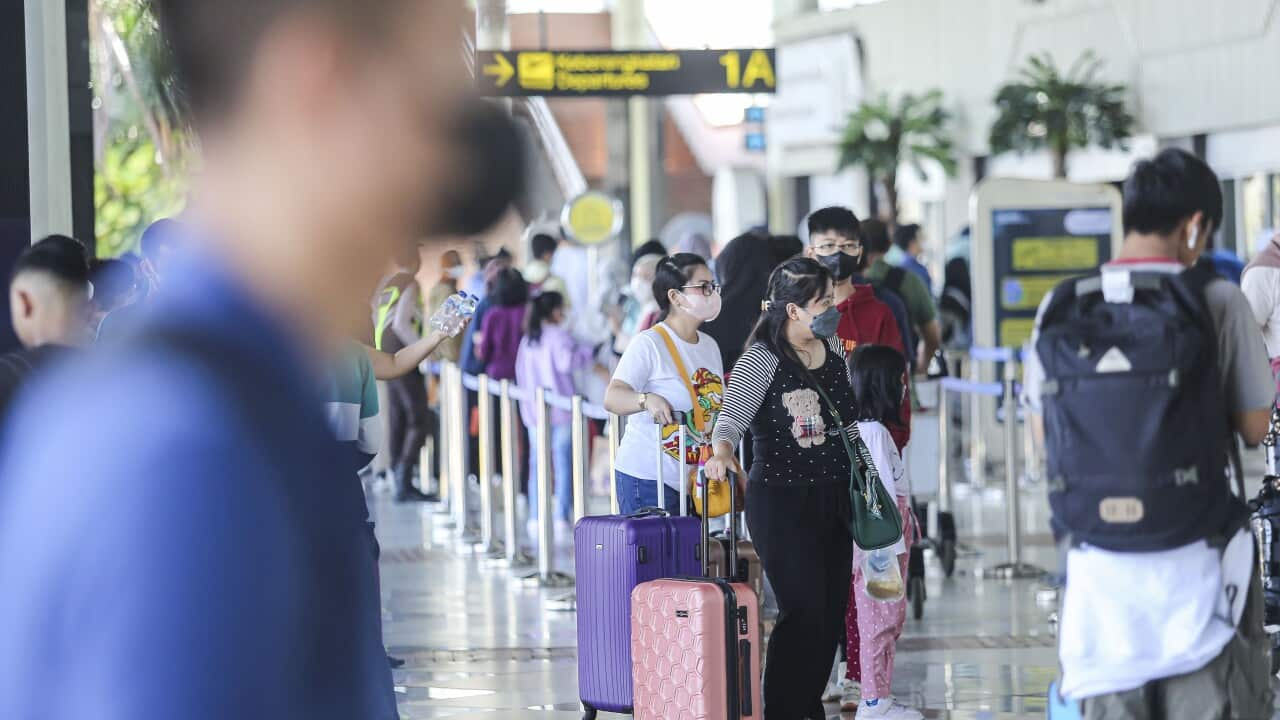
Travellers at Indonesia's Soekarno-Hatta International Airport. Indonesian ePassport holders will be prioritised by getting access smart gates at Australian airports. Source: Getty, Anadolu / Anadolu Agency/Anadolu Agency via Getty Images
- Prime Minister Anthony Albanese has met with Indonesia's president, making a series of announcements.
- Education, renewables and visa perks for Indonesians were among them.
- Indonesia also wants Australia's help on EV batteries and building its new capital city.
What new Australian visa changes are ahead for Indonesians?

Australia seeking to boost Indonesian language studies
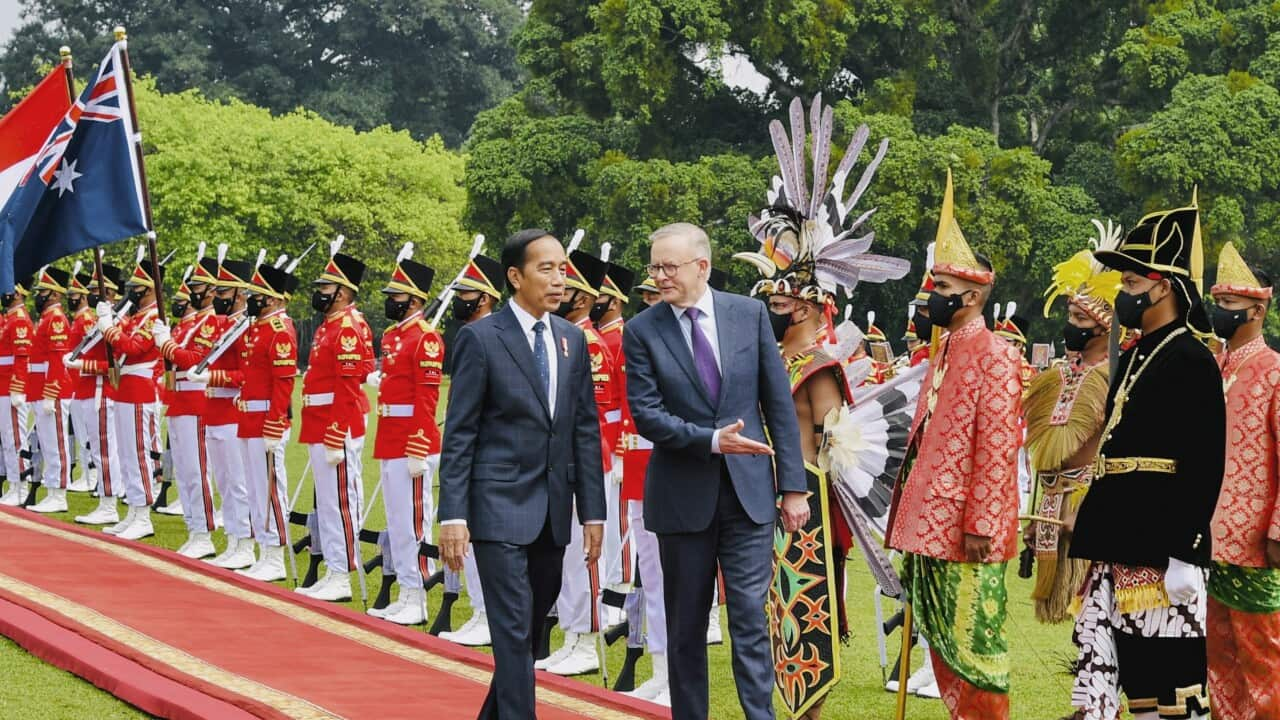
It's Australia's 'close friend' and a ‘future superpower’. Should more people learn its language?
Indonesia wants Australia to work on EV batteries

Want to do your job from paradise? These countries are offering 'digital nomad visas'
Indonesia invites Aussie companies to build capital city

Share this with family and friends
Recommended for you

Bondi attacker was known to police, no early indication of terrorism
Emergency Evacuations

What was thought to be a 'significant' COVID-19 milestone wasn't at all

Dying mother's bravery and other stories of courage emerge after Bondi stabbing attack
Police Investigation

Anthony Albanese says Bondi 'Bollard Man' can stay in Australia 'as long as he wants'
Sydney Stabbing

Who was Joel Cauchi, the Queensland man who carried out the Bondi mass stabbing?

Refugee who died defending others among six victims of Bondi stabbing attack

Anthony Albanese calls for calm after 'terrorist act'; police say rioters 'will be prosecuted'
News and Current Affairs

'I'm loving a monster': Bondi stabbing attacker Joel Cauchi's parents mourn 'very sick boy'
Mass Murder
Get SBS News daily and direct to your Inbox
Sign up now for the latest news from australia and around the world direct to your inbox..
Morning (Mon–Fri)
Afternoon (Mon–Fri)
By subscribing, you agree to SBS’s terms of service and privacy policy including receiving email updates from SBS.
SBS World News
You are using an outdated browser. Upgrade your browser today or install Google Chrome Frame to better experience this site.
Indonesia Traveler View
Travel health notices, vaccines and medicines, non-vaccine-preventable diseases, stay healthy and safe.
- Packing List
After Your Trip
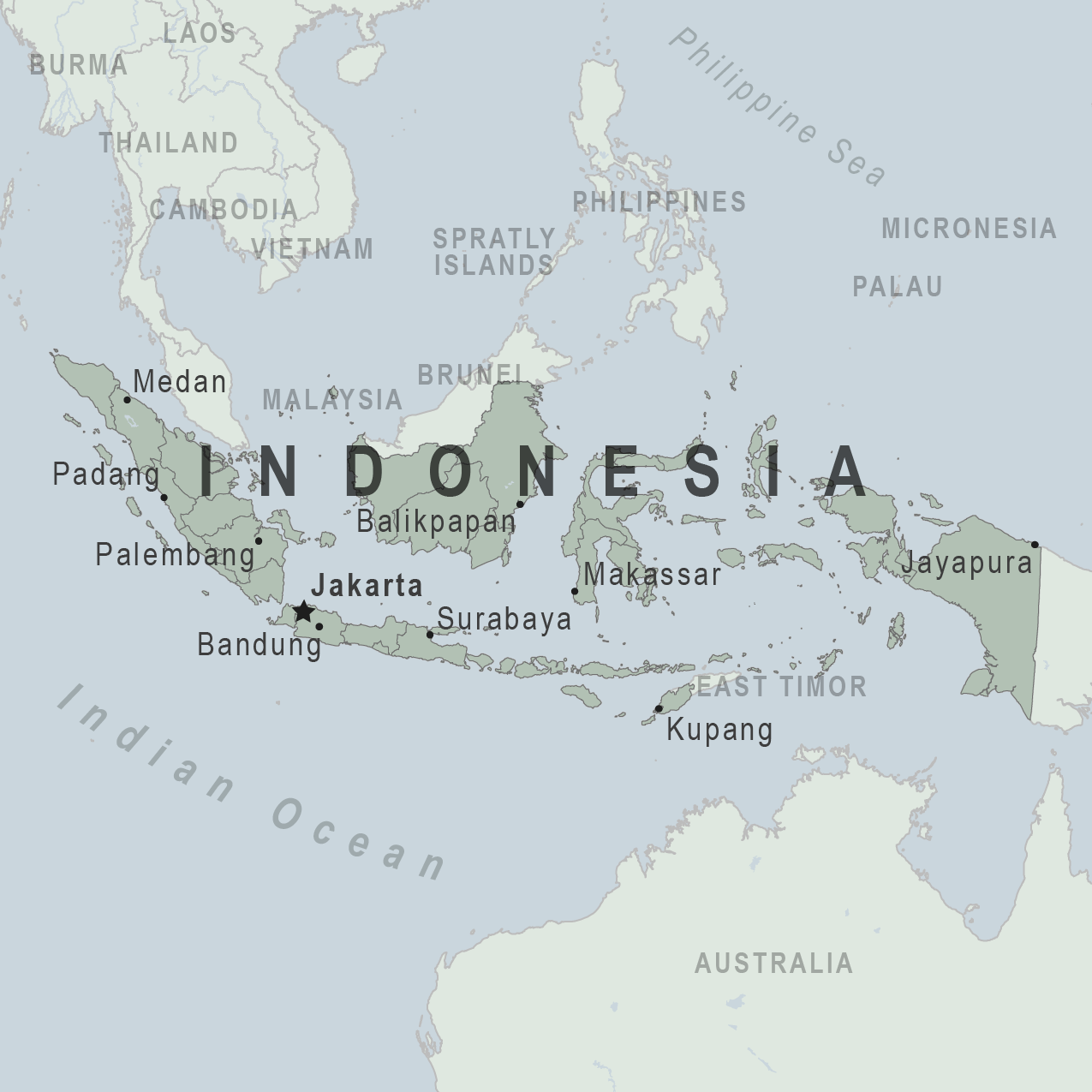
Be aware of current health issues in Indonesia. Learn how to protect yourself.
Level 2 Practice Enhanced Precautions
- Global Polio January 05, 2024 Some international destinations have circulating poliovirus. Before any international travel, make sure you are up to date on your polio vaccines. Destination List: Afghanistan, Algeria, Benin, Botswana, Burkina Faso, Burundi, Cameroon, Central African Republic, Chad, Côte d'Ivoire (Ivory Coast), Democratic Republic of the Congo, Egypt, Guinea, Indonesia, Israel, including the West Bank and Gaza, Kenya, Madagascar, Malawi, Mali, Mauritania, Mozambique, Niger, Nigeria, Pakistan, Republic of the Congo, Somalia, Sudan, Tanzania, including Zanzibar, Yemen, Zambia, Zimbabwe
Level 1 Practice Usual Precautions
- Updated Dengue in Asia and the Pacific Islands April 18, 2024 Dengue is a risk in many parts of Asia and the Pacific Islands. Some countries are reporting increased numbers of cases of the disease. Travelers to Asia and the Pacific Islands can protect themselves by preventing mosquito bites. Destination List: Cambodia, Indonesia, Laos, Malaysia, Singapore, Sri Lanka
- Global Measles March 22, 2024 Many international destinations are reporting increased numbers of cases of measles. Destination List: Afghanistan, Angola, Armenia, Azerbaijan, Benin, Burkina Faso, Burundi, Cameroon, Central African Republic, Chad, Côte d'Ivoire (Ivory Coast), Democratic Republic of the Congo, Djibouti, Equatorial Guinea, Ethiopia, Gabon, Ghana, India, Indonesia, Kazakhstan, Kyrgyzstan, Lebanon, Liberia, Libya, Malaysia, Mauritania, Nepal, Niger, Nigeria, Pakistan, Qatar, Republic of South Sudan, Republic of the Congo, Romania, Russia, Senegal, Somalia, Sri Lanka, Sudan, Syria, Tajikistan, Togo, Turkey, United Arab Emirates, Uzbekistan, Yemen, Zambia
⇧ Top
Check the vaccines and medicines list and visit your doctor at least a month before your trip to get vaccines or medicines you may need. If you or your doctor need help finding a location that provides certain vaccines or medicines, visit the Find a Clinic page.
Routine vaccines
Recommendations.
Make sure you are up-to-date on all routine vaccines before every trip. Some of these vaccines include
- Chickenpox (Varicella)
- Diphtheria-Tetanus-Pertussis
- Flu (influenza)
- Measles-Mumps-Rubella (MMR)
Immunization schedules
All eligible travelers should be up to date with their COVID-19 vaccines. Please see Your COVID-19 Vaccination for more information.
COVID-19 vaccine
Hepatitis A
Recommended for unvaccinated travelers one year old or older going to Indonesia.
Infants 6 to 11 months old should also be vaccinated against Hepatitis A. The dose does not count toward the routine 2-dose series.
Travelers allergic to a vaccine component or who are younger than 6 months should receive a single dose of immune globulin, which provides effective protection for up to 2 months depending on dosage given.
Unvaccinated travelers who are over 40 years old, immunocompromised, or have chronic medical conditions planning to depart to a risk area in less than 2 weeks should get the initial dose of vaccine and at the same appointment receive immune globulin.
Hepatitis A - CDC Yellow Book
Dosing info - Hep A
Hepatitis B
Recommended for unvaccinated travelers of all ages traveling to Indonesia.
Hepatitis B - CDC Yellow Book
Dosing info - Hep B
Japanese Encephalitis
Recommended for travelers who
- Are moving to an area with Japanese encephalitis to live
- Spend long periods of time, such as a month or more, in areas with Japanese encephalitis
- Frequently travel to areas with Japanese encephalitis
Consider vaccination for travelers
- Spending less than a month in areas with Japanese encephalitis but will be doing activities that increase risk of infection, such as visiting rural areas, hiking or camping, or staying in places without air conditioning, screens, or bed nets
- Going to areas with Japanese encephalitis who are uncertain of their activities or how long they will be there
Not recommended for travelers planning short-term travel to urban areas or travel to areas with no clear Japanese encephalitis season.
Japanese encephalitis - CDC Yellow Book
Japanese Encephalitis Vaccine for US Children
CDC recommends that travelers going to certain areas of Indonesia take prescription medicine to prevent malaria. Depending on the medicine you take, you will need to start taking this medicine multiple days before your trip, as well as during and after your trip. Talk to your doctor about which malaria medication you should take.
Find country-specific information about malaria.
Malaria - CDC Yellow Book
Considerations when choosing a drug for malaria prophylaxis (CDC Yellow Book)
Malaria information for Indonesia.
Cases of measles are on the rise worldwide. Travelers are at risk of measles if they have not been fully vaccinated at least two weeks prior to departure, or have not had measles in the past, and travel internationally to areas where measles is spreading.
All international travelers should be fully vaccinated against measles with the measles-mumps-rubella (MMR) vaccine, including an early dose for infants 6–11 months, according to CDC’s measles vaccination recommendations for international travel .
Measles (Rubeola) - CDC Yellow Book
In Indonesia poliovirus has been identified in the past year.
Travelers to Indonesia are at increased risk of exposure to poliovirus.
Vaccine recommendations : Adults traveling to Indonesia who received a complete polio vaccination series as children may receive a single lifetime booster dose of inactivated polio vaccine; travelers who are unvaccinated or not fully vaccinated should receive a complete polio vaccination series before travel. Children who are not fully vaccinated will be considered for an accelerated vaccination schedule .
Polio - CDC Yellow Book
Polio: For Travelers
Rabid dogs are commonly found in Indonesia. If you are bitten or scratched by a dog or other mammal while in Indonesia, there may be limited or no rabies treatment available.
Consider rabies vaccination before your trip if your activities mean you will be around dogs or wildlife.
Travelers more likely to encounter rabid animals include
- Campers, adventure travelers, or cave explorers (spelunkers)
- Veterinarians, animal handlers, field biologists, or laboratory workers handling animal specimens
- Visitors to rural areas
Since children are more likely to be bitten or scratched by a dog or other animals, consider rabies vaccination for children traveling to Indonesia.
Rabies - CDC Yellow Book
Recommended for most travelers, especially those staying with friends or relatives or visiting smaller cities or rural areas.
Typhoid - CDC Yellow Book
Dosing info - Typhoid
Yellow Fever
Required for travelers ≥9 months old arriving from countries with risk for YF virus transmission. 1
Yellow Fever - CDC Yellow Book
- Avoid contaminated water
Leptospirosis
How most people get sick (most common modes of transmission)
- Touching urine or other body fluids from an animal infected with leptospirosis
- Swimming or wading in urine-contaminated fresh water, or contact with urine-contaminated mud
- Drinking water or eating food contaminated with animal urine
- Avoid contaminated water and soil
Clinical Guidance
Schistosomiasis
- Wading, swimming, bathing, or washing in contaminated freshwater streams, rivers, ponds, lakes, or untreated pools.
Avoid bug bites
Chikungunya
- Mosquito bite
- Avoid Bug Bites
- Mosquito bite
- An infected pregnant woman can spread it to her unborn baby
Airborne & droplet
Avian/bird flu.
- Being around, touching, or working with infected poultry, such as visiting poultry farms or live-animal markets
- Avoid domestic and wild poultry
- Breathing in air or accidentally eating food contaminated with the urine, droppings, or saliva of infected rodents
- Bite from an infected rodent
- Less commonly, being around someone sick with hantavirus (only occurs with Andes virus)
- Avoid rodents and areas where they live
- Avoid sick people
Tuberculosis (TB)
- Breathe in TB bacteria that is in the air from an infected and contagious person coughing, speaking, or singing.
Learn actions you can take to stay healthy and safe on your trip. Vaccines cannot protect you from many diseases in Indonesia, so your behaviors are important.
Eat and drink safely
Food and water standards around the world vary based on the destination. Standards may also differ within a country and risk may change depending on activity type (e.g., hiking versus business trip). You can learn more about safe food and drink choices when traveling by accessing the resources below.
- Choose Safe Food and Drinks When Traveling
- Water Treatment Options When Hiking, Camping or Traveling
- Global Water, Sanitation and Hygiene | Healthy Water
- Avoid Contaminated Water During Travel
You can also visit the Department of State Country Information Pages for additional information about food and water safety.

Prevent bug bites
Bugs (like mosquitoes, ticks, and fleas) can spread a number of diseases in Indonesia. Many of these diseases cannot be prevented with a vaccine or medicine. You can reduce your risk by taking steps to prevent bug bites.
What can I do to prevent bug bites?
- Cover exposed skin by wearing long-sleeved shirts, long pants, and hats.
- Use an appropriate insect repellent (see below).
- Use permethrin-treated clothing and gear (such as boots, pants, socks, and tents). Do not use permethrin directly on skin.
- Stay and sleep in air-conditioned or screened rooms.
- Use a bed net if the area where you are sleeping is exposed to the outdoors.
What type of insect repellent should I use?
- FOR PROTECTION AGAINST TICKS AND MOSQUITOES: Use a repellent that contains 20% or more DEET for protection that lasts up to several hours.
- Picaridin (also known as KBR 3023, Bayrepel, and icaridin)
- Oil of lemon eucalyptus (OLE) or para-menthane-diol (PMD)
- 2-undecanone
- Always use insect repellent as directed.
What should I do if I am bitten by bugs?
- Avoid scratching bug bites, and apply hydrocortisone cream or calamine lotion to reduce the itching.
- Check your entire body for ticks after outdoor activity. Be sure to remove ticks properly.
What can I do to avoid bed bugs?
Although bed bugs do not carry disease, they are an annoyance. See our information page about avoiding bug bites for some easy tips to avoid them. For more information on bed bugs, see Bed Bugs .
For more detailed information on avoiding bug bites, see Avoid Bug Bites .
Stay safe outdoors
If your travel plans in Indonesia include outdoor activities, take these steps to stay safe and healthy during your trip.
- Stay alert to changing weather conditions and adjust your plans if conditions become unsafe.
- Prepare for activities by wearing the right clothes and packing protective items, such as bug spray, sunscreen, and a basic first aid kit.
- Consider learning basic first aid and CPR before travel. Bring a travel health kit with items appropriate for your activities.
- If you are outside for many hours in heat, eat salty snacks and drink water to stay hydrated and replace salt lost through sweating.
- Protect yourself from UV radiation : use sunscreen with an SPF of at least 15, wear protective clothing, and seek shade during the hottest time of day (10 a.m.–4 p.m.).
- Be especially careful during summer months and at high elevation. Because sunlight reflects off snow, sand, and water, sun exposure may be increased during activities like skiing, swimming, and sailing.
- Very cold temperatures can be dangerous. Dress in layers and cover heads, hands, and feet properly if you are visiting a cold location.
Stay safe around water
- Swim only in designated swimming areas. Obey lifeguards and warning flags on beaches.
- Practice safe boating—follow all boating safety laws, do not drink alcohol if driving a boat, and always wear a life jacket.
- Do not dive into shallow water.
- Do not swim in freshwater in developing areas or where sanitation is poor.
- Avoid swallowing water when swimming. Untreated water can carry germs that make you sick.
- To prevent infections, wear shoes on beaches where there may be animal waste.
Schistosomiasis, a parasitic infection that can be spread in fresh water, is found in Indonesia. Avoid swimming in fresh, unchlorinated water, such as lakes, ponds, or rivers.
Keep away from animals
Most animals avoid people, but they may attack if they feel threatened, are protecting their young or territory, or if they are injured or ill. Animal bites and scratches can lead to serious diseases such as rabies.
Follow these tips to protect yourself:
- Do not touch or feed any animals you do not know.
- Do not allow animals to lick open wounds, and do not get animal saliva in your eyes or mouth.
- Avoid rodents and their urine and feces.
- Traveling pets should be supervised closely and not allowed to come in contact with local animals.
- If you wake in a room with a bat, seek medical care immediately. Bat bites may be hard to see.
All animals can pose a threat, but be extra careful around dogs, bats, monkeys, sea animals such as jellyfish, and snakes. If you are bitten or scratched by an animal, immediately:
- Wash the wound with soap and clean water.
- Go to a doctor right away.
- Tell your doctor about your injury when you get back to the United States.
Consider buying medical evacuation insurance. Rabies is a deadly disease that must be treated quickly, and treatment may not be available in some countries.
Reduce your exposure to germs
Follow these tips to avoid getting sick or spreading illness to others while traveling:
- Wash your hands often, especially before eating.
- If soap and water aren’t available, clean hands with hand sanitizer (containing at least 60% alcohol).
- Don’t touch your eyes, nose, or mouth. If you need to touch your face, make sure your hands are clean.
- Cover your mouth and nose with a tissue or your sleeve (not your hands) when coughing or sneezing.
- Try to avoid contact with people who are sick.
- If you are sick, stay home or in your hotel room, unless you need medical care.
Avoid sharing body fluids
Diseases can be spread through body fluids, such as saliva, blood, vomit, and semen.
Protect yourself:
- Use latex condoms correctly.
- Do not inject drugs.
- Limit alcohol consumption. People take more risks when intoxicated.
- Do not share needles or any devices that can break the skin. That includes needles for tattoos, piercings, and acupuncture.
- If you receive medical or dental care, make sure the equipment is disinfected or sanitized.
Know how to get medical care while traveling
Plan for how you will get health care during your trip, should the need arise:
- Carry a list of local doctors and hospitals at your destination.
- Review your health insurance plan to determine what medical services it would cover during your trip. Consider purchasing travel health and medical evacuation insurance.
- Carry a card that identifies, in the local language, your blood type, chronic conditions or serious allergies, and the generic names of any medications you take.
- Some prescription drugs may be illegal in other countries. Call Indonesia’s embassy to verify that all of your prescription(s) are legal to bring with you.
- Bring all the medicines (including over-the-counter medicines) you think you might need during your trip, including extra in case of travel delays. Ask your doctor to help you get prescriptions filled early if you need to.
Many foreign hospitals and clinics are accredited by the Joint Commission International. A list of accredited facilities is available at their website ( www.jointcommissioninternational.org ).
In some countries, medicine (prescription and over-the-counter) may be substandard or counterfeit. Bring the medicines you will need from the United States to avoid having to buy them at your destination.
Malaria is a risk in some parts of Indonesia. If you are going to a risk area, fill your malaria prescription before you leave, and take enough with you for the entire length of your trip. Follow your doctor’s instructions for taking the pills; some need to be started before you leave.
Select safe transportation
Motor vehicle crashes are the #1 killer of healthy US citizens in foreign countries.
In many places cars, buses, large trucks, rickshaws, bikes, people on foot, and even animals share the same lanes of traffic, increasing the risk for crashes.
Be smart when you are traveling on foot.
- Use sidewalks and marked crosswalks.
- Pay attention to the traffic around you, especially in crowded areas.
- Remember, people on foot do not always have the right of way in other countries.
Riding/Driving
Choose a safe vehicle.
- Choose official taxis or public transportation, such as trains and buses.
- Ride only in cars that have seatbelts.
- Avoid overcrowded, overloaded, top-heavy buses and minivans.
- Avoid riding on motorcycles or motorbikes, especially motorbike taxis. (Many crashes are caused by inexperienced motorbike drivers.)
- Choose newer vehicles—they may have more safety features, such as airbags, and be more reliable.
- Choose larger vehicles, which may provide more protection in crashes.
Think about the driver.
- Do not drive after drinking alcohol or ride with someone who has been drinking.
- Consider hiring a licensed, trained driver familiar with the area.
- Arrange payment before departing.
Follow basic safety tips.
- Wear a seatbelt at all times.
- Sit in the back seat of cars and taxis.
- When on motorbikes or bicycles, always wear a helmet. (Bring a helmet from home, if needed.)
- Avoid driving at night; street lighting in certain parts of Indonesia may be poor.
- Do not use a cell phone or text while driving (illegal in many countries).
- Travel during daylight hours only, especially in rural areas.
- If you choose to drive a vehicle in Indonesia, learn the local traffic laws and have the proper paperwork.
- Get any driving permits and insurance you may need. Get an International Driving Permit (IDP). Carry the IDP and a US-issued driver's license at all times.
- Check with your auto insurance policy's international coverage, and get more coverage if needed. Make sure you have liability insurance.
- Avoid using local, unscheduled aircraft.
- If possible, fly on larger planes (more than 30 seats); larger airplanes are more likely to have regular safety inspections.
- Try to schedule flights during daylight hours and in good weather.
Medical Evacuation Insurance
If you are seriously injured, emergency care may not be available or may not meet US standards. Trauma care centers are uncommon outside urban areas. Having medical evacuation insurance can be helpful for these reasons.
Helpful Resources
Road Safety Overseas (Information from the US Department of State): Includes tips on driving in other countries, International Driving Permits, auto insurance, and other resources.
The Association for International Road Travel has country-specific Road Travel Reports available for most countries for a minimal fee.
For information traffic safety and road conditions in Indonesia, see Travel and Transportation on US Department of State's country-specific information for Indonesia .
Traffic flows on the left side of the road in Indonesia.
- Always pay close attention to the flow of traffic, especially when crossing the street.
- LOOK RIGHT for approaching traffic.
Maintain personal security
Use the same common sense traveling overseas that you would at home, and always stay alert and aware of your surroundings.
Before you leave
- Research your destination(s), including local laws, customs, and culture.
- Monitor travel advisories and alerts and read travel tips from the US Department of State.
- Enroll in the Smart Traveler Enrollment Program (STEP) .
- Leave a copy of your itinerary, contact information, credit cards, and passport with someone at home.
- Pack as light as possible, and leave at home any item you could not replace.
While at your destination(s)
- Carry contact information for the nearest US embassy or consulate .
- Carry a photocopy of your passport and entry stamp; leave the actual passport securely in your hotel.
- Follow all local laws and social customs.
- Do not wear expensive clothing or jewelry.
- Always keep hotel doors locked, and store valuables in secure areas.
- If possible, choose hotel rooms between the 2nd and 6th floors.
Healthy Travel Packing List
Use the Healthy Travel Packing List for Indonesia for a list of health-related items to consider packing for your trip. Talk to your doctor about which items are most important for you.
Why does CDC recommend packing these health-related items?
It’s best to be prepared to prevent and treat common illnesses and injuries. Some supplies and medicines may be difficult to find at your destination, may have different names, or may have different ingredients than what you normally use.
If you are not feeling well after your trip, you may need to see a doctor. If you need help finding a travel medicine specialist, see Find a Clinic . Be sure to tell your doctor about your travel, including where you went and what you did on your trip. Also tell your doctor if you were bitten or scratched by an animal while traveling.
If your doctor prescribed antimalarial medicine for your trip, keep taking the rest of your pills after you return home. If you stop taking your medicine too soon, you could still get sick.
Malaria is always a serious disease and may be a deadly illness. If you become ill with a fever either while traveling in a malaria-risk area or after you return home (for up to 1 year), you should seek immediate medical attention and should tell the doctor about your travel history.
For more information on what to do if you are sick after your trip, see Getting Sick after Travel .
Map Disclaimer - The boundaries and names shown and the designations used on maps do not imply the expression of any opinion whatsoever on the part of the Centers for Disease Control and Prevention concerning the legal status of any country, territory, city or area or of its authorities, or concerning the delimitation of its frontiers or boundaries. Approximate border lines for which there may not yet be full agreement are generally marked.
Other Destinations
If you need help finding travel information:
Message & data rates may apply. CDC Privacy Policy
File Formats Help:
- Adobe PDF file
- Microsoft PowerPoint file
- Microsoft Word file
- Microsoft Excel file
- Audio/Video file
- Apple Quicktime file
- RealPlayer file
- Zip Archive file
Exit Notification / Disclaimer Policy
- The Centers for Disease Control and Prevention (CDC) cannot attest to the accuracy of a non-federal website.
- Linking to a non-federal website does not constitute an endorsement by CDC or any of its employees of the sponsors or the information and products presented on the website.
- You will be subject to the destination website's privacy policy when you follow the link.
- CDC is not responsible for Section 508 compliance (accessibility) on other federal or private website.
- [email protected]
- +62 21 300 297 27
- +62 812 9260 0590
- Jakarta Office:
- Creative Centre Office:
- Seminyak Office:
- +62 361 934 8343
- Canggu Office:
- +62 361 939 9406
- Sanur Office:
- +62 361 280 789

Indonesia Visa: Indonesia Visas for Australia
LetsMoveIndonesia
Indonesia is a popular holiday destination for Australians, hosting over a million visitors from down under every year. The pandemic has caused a dip in tourist numbers, but the Indonesia Minister of Tourism and Creative Economy expects a gradual return to pre-Covid levels. Indonesia is known for its luxury resorts, wellness facilities, and cultural attractions and as a hub for new business opportunities.
Since 2019, a few changes have been made to the process of applying for an Australian visa. In this guide, LetsMoveIndonesia – Indonesia’s largest visa agency will provide an overview of the current situation and explain the requirements for applying for a visa. If you have any questions or need clarification, please contact us; we will be happy to help!
Back in 2019, Australians could easily come to Indonesia or any other destination in Indonesia without having to pre-book a visa. Upon arrival, they could use the free visa exemption that was available to them as part of the 168 nationalities. However, as of November 2022, this is no longer the case.
The current situation for Indonesia Visa Arrivals
If you are an Australian travelling to Indonesia, you can get a Visa on Arrival. This is similar to the free visa you may have used in the past, but this one has a fee that must be paid upon arrival.
Indonesian Visa on Arrival for Australians
Upon arriving in Indonesia, you must pay a fee of US$35 / 500,000 IDR for a Visa on Arrival. Once paid, you are allowed to stay in Indonesia for 30 days. If you want to stay longer, you can extend your visa arrival with LetsMoveIndonesia and stay for an additional 30 days. Note: If you arrive using the Visa on Arrival, you cannot apply for any other visa while in the country. Once the 60 days are up, you must leave Indonesia.
Overstay charges have gone up from 300,000 IDR to 1,000,000 so overstaying now can prove to be a very costly mistake.
To find out more about the Visa on Arrival, check out this article: Everything you need to know about the Visa on Arrival
To extend your Indonesia Visa on Arrival click this link: Visa on Arrival Extensions
Update Visa on Arrival September 2023
As of September 2023, The Indonesian government has expanded its Visa on Arrival and e-visa program by including Armenia, Mozambique, and Tanzania in the list of countries eligible for these travel options. This move aims to further promote tourism and facilitate entry into Indonesia for citizens of these nations. Travellers from Armenia, Mozambique, and Tanzania can now conveniently obtain their visas upon arrival or through the online e-visa application system, making their visits to Indonesia smoother and more accessible.
Planning to visit Indonesia for longer than 60 days?
If you intend to visit Indonesia for more than 60 days for tourism or business reasons (not working), you can apply for a Single Entry Tourist/Business Visa.
This visa allows you a one-time entry into the country and cannot be used for multiple entries; meaning if you enter the country using it, you cannot leave and come back in using the same visa.
The Single Entry Visa provides you with a 60-day stay permit, which can be extended two times, each additional 60 days. In total, you can spend up to 180 days within Indonesia and if it runs out, you can simply apply for another visa onshore.
To read more about the Single Entry Visa, check out our article: The Single Entry Social Visa – Everything you need to know!
Stay longer in Indonesia with KITAS
It is important to remember that you cannot apply for any other type of visa if you are using a Visa on Arrival in Indonesia. Therefore, if you plan to stay longer with a temporary stay permit (KITAS), you will need to either do this from outside the country or arrive using a Single Entry Visa and then convert it to Indonesia.
The process of converting visas to KITAS has become extremely difficult, time-consuming, and expensive, so we would recommend anyone who is planning to apply for a KITAS to do it from outside the country so that the application can be done online rather than having to go through immigration offices.
KITAS/KITAP (Temporary and Permanent Stay Permits for Australians
The KITAS and KITAP visa application process is still available for those looking to stay in Indonesia for an extended period.
These visas are available in many different categories, such as working, retirement, investor, spouse, dependent, and more.
Each visa type requires a different sponsor. For more information on these visa types and the sponsors, feel free to contact us or check out our Visa Services page.
Passport validity
The most essential requirement should be the expiration date of your passport. Every Australian tourist visiting Indonesia must have a passport which is still valid for at least 6 more months from the date of application.
Space in your passport
It is important to make sure that you will have enough pages in your passport that can be stamped when travelling to Australia.
That’s pretty much it for our Indonesia visa guide for Australians. If you have any questions or need to know more, make sure you contact us and we will be happy to help! WA: +62 812 9260 0590, T: +62 21 300 297 27 (Jakarta) T: +62 361 934 8343 (Seminyak) T: +62 361 939 9406 (Canggu), T: +62 361 280 789 (Sanur), E: [email protected]
About LetsMoveIndonesia
LetsMoveIndonesia is a visa agency that helps foreigners enter Indonesia. It was founded by Gary Joy, a British expatriate, in 2016. Recently, it was awarded the title of “Best Visa and Business Consultancy in Indonesia” by the National Award Foundation. LetsMoveIndonesia is transparent with its pricing, has ethical values, and is the leading visa agency in the country. It has three offices in Indonesia (Seminyak, Canggu and Sanur) and a headquarters in Jakarta.
To find out more about all things Indonesia Visa-related, then check out our Indonesia Visa page !
Get Your Free Consultation
Interesting news.

Get your Single Entry Business Visa and enter Indonesia

The New E-Visa Everything You Need to Know

How to Set Up a Business in Indonesia

The Investor KITAS in Indonesia – Everything You Need to Know!
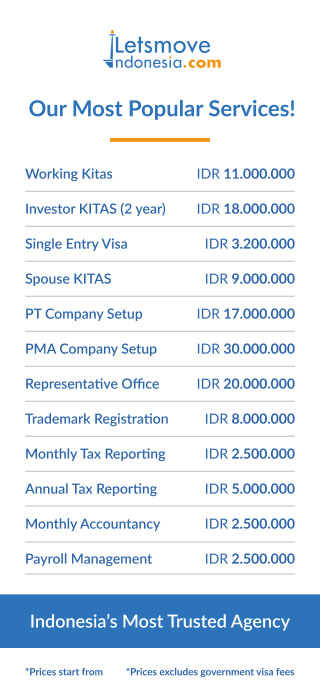
Latest News

Are Investor KITAS and Golden Visa The Same? Understanding Long-Term Investor Visa Options in Indonesia
Indonesia’s dynamic and vast developing economy has become one of the major reasons for foreign investors to catch an eye on entering its market. The evident outlook projects the sustainable economic growth momentum in 2024, with a forecasted GDP growth of 4.9%, according to Tempo. Despite facing continuous challenges from the lacklustre global economic environment […]

The Music Performer Visa Indonesia: Everything You Need to Know
Ed Sheeran’s mega-concert at the Jakarta International Stadium (JIS) on the 2nd of March was not just a musical spectacle – it also marked a turning point for foreign artists entering Indonesia. Sheeran’s tour was known to use the newest addition of the Indonesian Stay Permit called the Music Performer Visa. While Ed Sheeran may […]
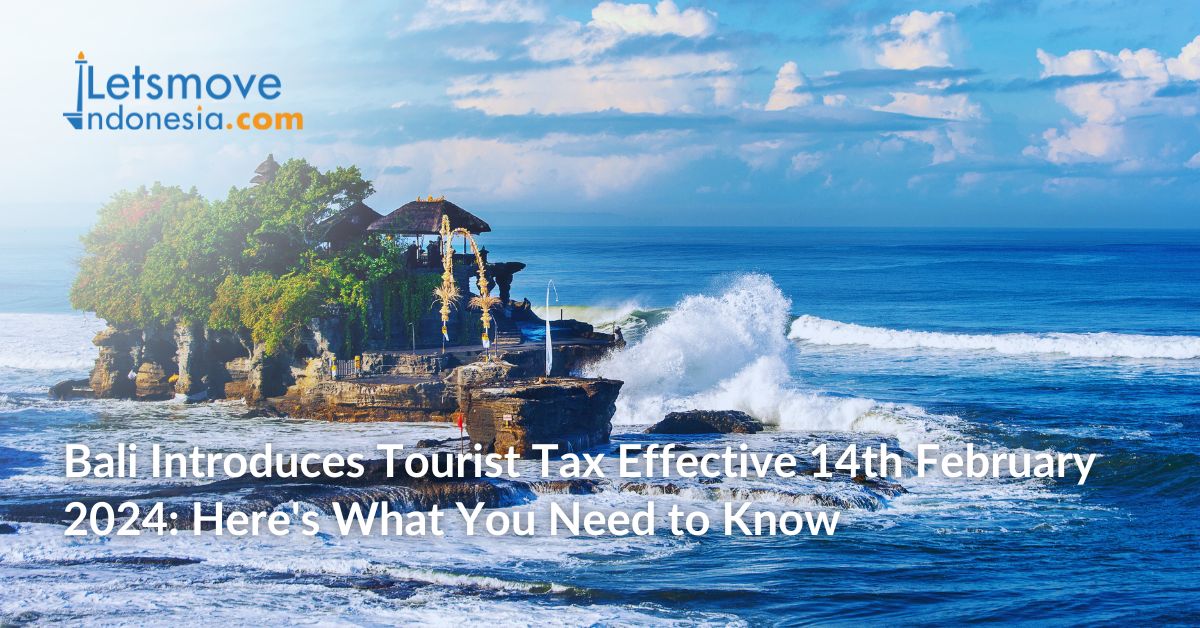
Bali Introduces Tourist Tax Effective 14th February 2024: Here’s What You Need to Know
As a world-renowned traveller’s paradise, Bali welcomes millions each year. However, for travellers seeking to venture to the Island of God, there will be another requirement you have to fulfil. In an attempt to enhance sustainability and improve visitor experiences, The Bali Government designed a new tourist levy that will be implemented from 14th February […]

The LetsMoveIndonesia Referral Scheme is Back! Earn money by referring to us!
LetsMoveIndonesia is excited to announce the highly-anticipated return of our Refer a Friend Programme! At LetsMoveIndonesia, we believe that sharing is caring. Therefore, on the third edition of our referral scheme, we reflect on the tremendous success of our past campaigns, where we have distributed tens of millions in referral fees to those who have […]

The Single Entry Social Visa Indonesia 2024: Everything You Need to Know
Among the various visa options available, the Single Entry Social Visa (Index C6) stands out as a convenient and secure scheme, especially for those desiring a stay of more than 30 days. In this article, we’ll delve into the intricacies of the Single Entry Social Visa, providing a comprehensive guide for individuals looking to explore […]

LetsMoveIndonesia Announces Service Transition from Tourist Visa to Single Entry Social Visa
Following the recent updates in Indonesia Visa regulations, LetsMoveIndonesia is pleased to announce a pivotal service transition from the Single Entry Tourist Visa to the new Single Entry Social Visa. This strategic move comes in response to evolving travel needs and regulatory changes, offering our clients a more comprehensive and adaptable solution for their stay […]
Our journey began in 2016 when we had one goal-to become Indonesia’s Most Ethical Visa & Business Consultancy. Our dream was to become a one stop shop for all expatriate needs, offering honest & transparent services at competitive prices. Find Out More »
Enter your email address to get latest updates and offers from us.
Popular Services
- Working KITAS
- Investor KITAS
- Single Entry Social Visa
- Spouse KITAS
- PMA Establishment
- Trademark Registration
- Individual Tax Reporting
- Annual Tax Reporting
Recent Posts
- +62 21 300 297 27 (Jakarta)
- +62 361 934 8343 (Seminyak)
- +62 361 939 9406 (Canggu)
- +62 361 280 789 (Sanur)
Get connected with us on
- Visa Services
- Legal Services
- Tax & Accoutancy
- Mortgage Services
- Real Estate
Copyright © 2024. All Rights Reserved.
- Travel Updates
Volcano erupts in Indonesia, alert level raised to highest: ‘Ejection of rocks, hot cloud discharges’
A tsunami alert has been issued after a volcano erupted several times in Indonesia, with more than 11,000 people forced to evacuate.
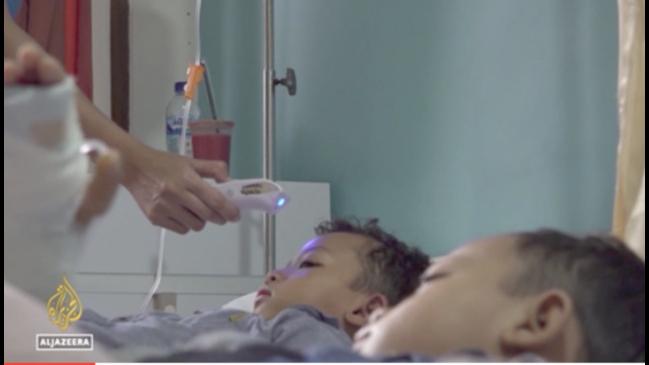
Aussies ‘locked out’ of national parks
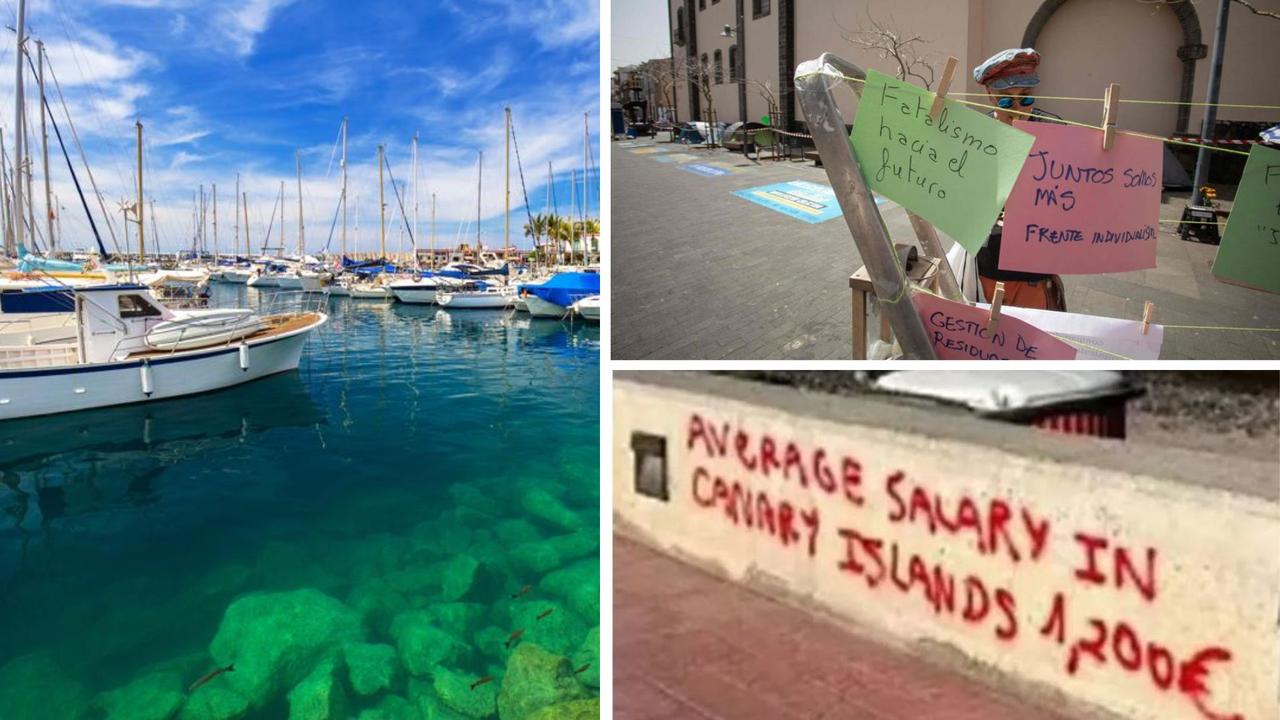
‘Cancer consuming’ this popular island
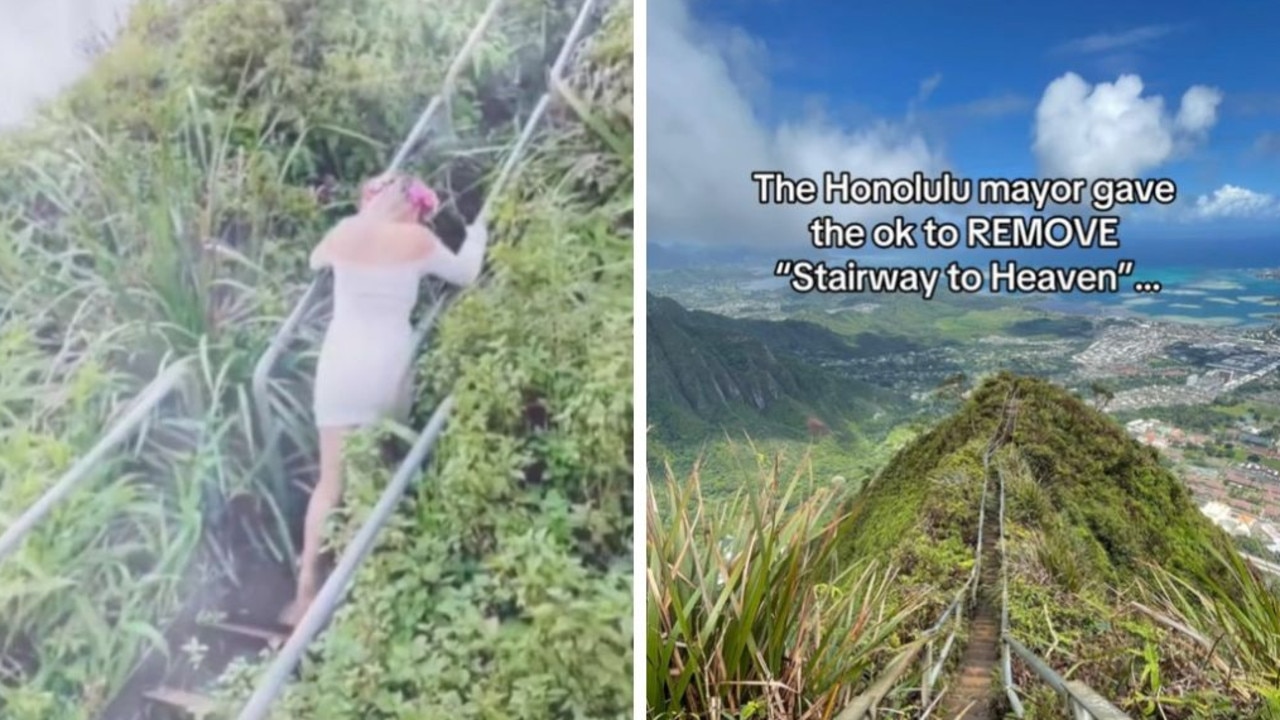
‘Long overdue’: Tourist spot to be demolished
A tsunami alert has been issued for one of Australia’s closest neighbours, where a major Indonesian volcano had erupted several times in 24 hours.
Mount Ruang, a stratovolcano in Indonesia’s remote reaches, has unleashed a fury of eruptions, prompting authorities to issue a tsunami alert and evacuate over 11,000 residents to flee their homes.
Some photos released by authorities show apocalyptic scenes as ash clouds intertwine with lightning.
The volcano’s relentless activity, with five major eruptions in 24 hours, has sparked widespread concern and necessitated swift action from Indonesia’s Center for Volcanology and Geological Disaster Mitigation.
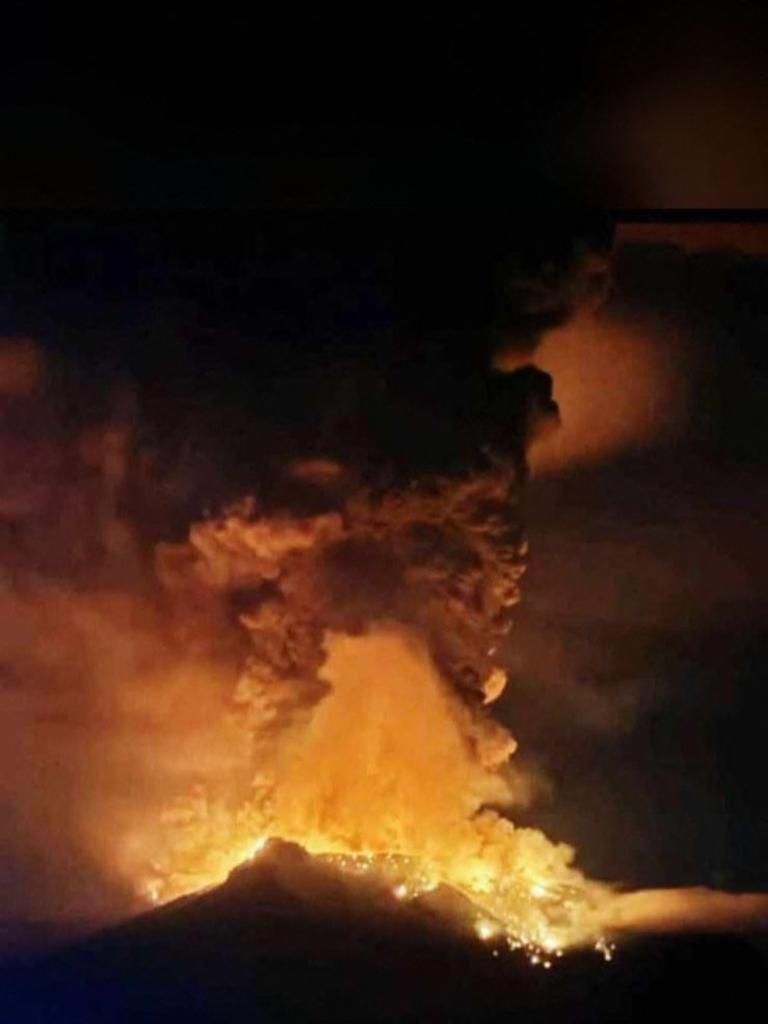
With ash clouds billowing thousands of metres into the sky, the repercussions of Mount Ruang’s eruptions are felt far and wide, despite its distance of 1640 kilometres from the bustling tourist hub of Bali.
The initial eruption on Tuesday night, followed by four subsequent eruptions throughout Wednesday, has thrust the North Sulawesi Province region into a state of heightened alert.

“In light of the escalating volcanic activity observed visually and instrumentally, Mount Ruang’s alert level has been elevated from Level 3 to Level 4,” Hendra Gunawan, the director of Indonesia’s volcanology agency warned on Wednesday night.
The escalation prompted authorities to expand the exclusion zone around the crater from four to six kilometres, a precautionary measure aimed at safeguarding residents from potential harm.
Antara, the state news agency, reported the evacuation of over 800 individuals from two villages on Ruang Island to the safer confines of Tagulandang Island, situated more than a hundred kilometres north of the provincial capital, Manado.
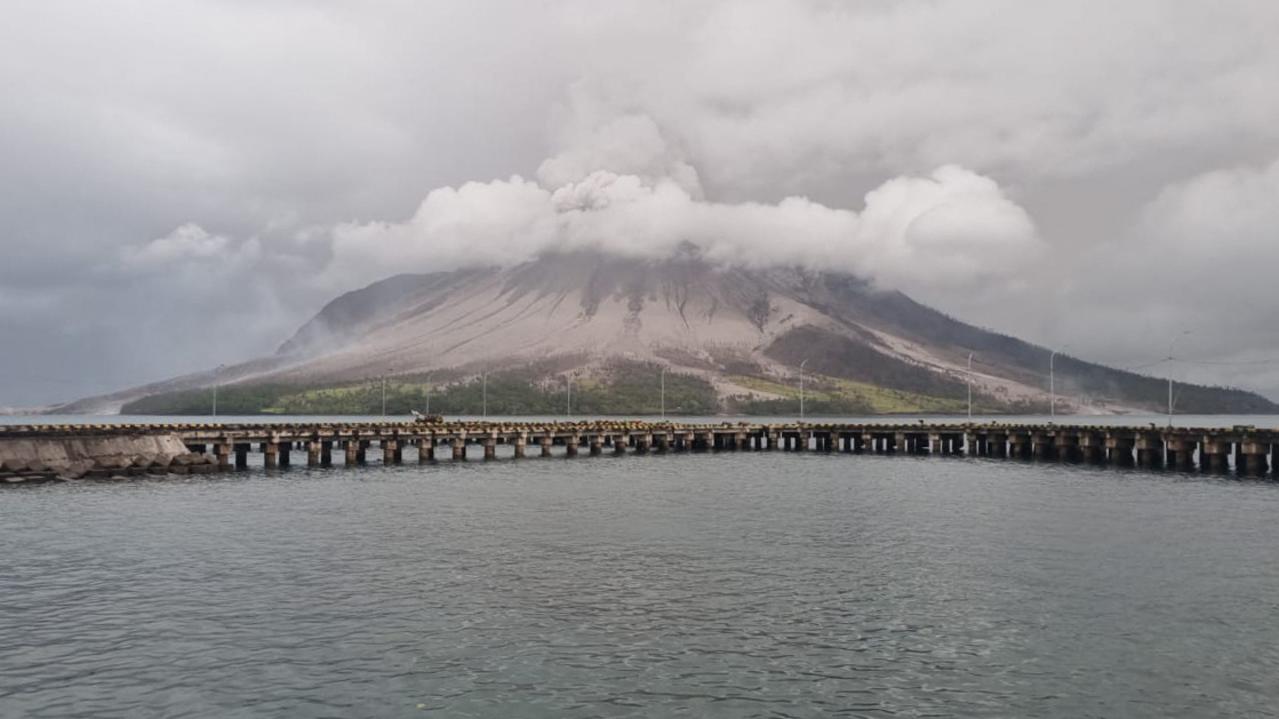
“Residents of Tagulandang must evacuate beyond the six-kilometer radius by Wednesday evening,” Gunawan said.
“Be on alert for the potential ejection of rocks, hot cloud discharges and tsunami caused by the collapse of the volcano’s body into the sea.”
The eruptions have propelled ash columns up to two and a half kilometres high and have intensified following a series of earthquakes in recent weeks, as noted by Muhammad Wafid, the head of the geological agency. The recent increase in volcanic activity highlights Indonesia’s ongoing risk of earthquakes and volcanic eruptions.
The archipelago nation is located in the Pacific “Ring of Fire,” a region stretching from Japan through Southeast Asia and across the Pacific basin, known for its frequent geological disturbances.
– With AFP
A growing number of Australia’s most beautiful natural environments are being closed off to the public in a “crazy” trend.
It’s the idyllic string of islands that’s drawing millions of tourists each and every year. But a sinister trend is pushing the region to “breaking point”.
Tourists have been blamed for destroying an iconic attraction in Hawaii with the site now being demolished as a result of trespassing.

Countries, economies and regions
Select a country, economy or region to find embassies, country briefs, economic fact sheets, trade agreements, aid programs, information on sanctions and more.
International relations
Global security.
- Australia and sanctions
- Australian Safeguards and Non-proliferation Office (ASNO)
- Counter-terrorism
- Non-proliferation, disarmament and arms control
- Peacekeeping and peacebuilding
Regional architecture
- Asia Pacific Economic Cooperation (APEC)
- Association of Southeast Asian Nations (ASEAN)
- East Asia Summit (EAS)
- Australia and the Indian Ocean region
- Pacific Islands regional organisations
Global themes
- Child protection
- Climate change
- Cyber affairs and critical technology
- Disability Equity and Rights
- Gender equality
- Human rights
- Indigenous peoples
- People Smuggling, Human Trafficking and Modern Slavery
- Preventing Sexual Exploitation, Abuse and Harassment
- Australia’s treaty-making process
International organisations
- The Commonwealth of Nations
- United Nations (UN)
- World Trade Organization
Foreign Arrangements Scheme
Trade and investment, about free trade agreements (ftas).
- The benefits of FTAs
- How to get free trade agreement tariff cuts
- Look up FTA tariffs and services market access - DFAT FTA Portal
- Discussion paper on potential modernisation – DFAT FTA Portal
About foreign investment
- The benefits of foreign investment
- Investor-state dispute settlement (ISDS)
- Australia's bilateral investment treaties
- Australia's foreign investment policy
For Australian business
- Addressing non-tariff trade barriers
Expo 2025 Osaka, Kansai
Stakeholder engagement.
- Ministerial Council on Trade and Investment
- Trade 2040 Taskforce
- First Nations trade
Australia's free trade agreements (FTAs)
- ASEAN-Australia-New Zealand (AANZFTA)
- Chile (ACLFTA)
- China (ChAFTA)
- Hong Kong ( A-HKFTA & IA)
- India (AI-ECTA)
- Indonesia (IA-CEPA)
- Japan (JAEPA)
- Korea (KAFTA)
- Malaysia (MAFTA)
- New Zealand (ANZCERTA)
- Peru (PAFTA)
- Singapore (SAFTA)
- Thailand (TAFTA)
- United Kingdom (A-UKFTA)
- USA (AUSFTA)
- Trans-Pacific Partnership (TPP)
- European Union (A-EUFTA)
- India (AI-CECA)
- Australia-UAE Comprehensive Economic Partnership Agreement
- Australia-Gulf Cooperation Council (GCC)
Trade and investment data, information and publications
- Fact sheets for countries and regions
- Australia's trade balance
- Trade statistics
- Foreign investment statistics
- Trade and investment publications
- Australia's Trade through Time
WTO, G20, OECD, APEC and IPEF and ITAG
Services and digital trade.
- Service trade policy
- Australia-Singapore Digital Economy Agreement
- Digital trade & the digital economy
Development
Australia’s development program, performance assessment.
- Development evaluation
- Budget and statistical information
Who we work with
- Multilateral organisations
- Non-government organisations (NGOs)
- List of Australian accredited non-government organisations (NGOs)
Development topics
- Development issues
- Development sectors
2030 Agenda for Sustainable Development
- Sustainable Development Goals
Where we deliver our Development Program
Humanitarian action.
Where and how Australia provides emergency assistance.
People-to-people
Australia awards.
- Australia Awards Scholarships
- Australia Awards Fellowships
New Colombo Plan
- Scholarship program
- Mobility program
Public diplomacy
- Australian Cultural Diplomacy Grants Program
- Australia now
- UK/Australia Season 2021-22
Foundations, councils and institutes
- Australia-ASEAN Council
- Australia-India Council
- Australia-Indonesia Institute
- Australia-Japan Foundation
- Australia-Korea Foundation
- Council for Australian-Arab Relations (CAAR)
- Council on Australia Latin America Relations (COALAR)
International Labour Mobility
- Pacific Labour Mobility Scheme
- Agriculture Visa
Australian Volunteers Program
Supporting organisations in developing countries by matching them with skilled Australians.
Sports diplomacy
Australia is a successful global leader and innovator in sport.
A global platform for achievement, innovation, collaboration, and cooperation
About Australia
Australia is a stable, democratic and culturally diverse nation with a highly skilled workforce and one of the strongest performing economies in the world.
Australia in Brief publication
This is the 52nd edition of Australia in Brief, revised and updated in February 2021
Travel advice
To help Australians avoid difficulties overseas, we maintain travel advisories for more than 170 destinations.
- Smartraveller – travel advice
International COVID-19 Vaccination Certificate
Prove your COVID-19 vaccinations when you travel overseas.
- Services Australia
The Australian Passport Office and its agents are committed to providing a secure, efficient and responsive passport service for Australia.
- Australian Passport Office
24-hour consular emergency helpline
- Within Australia: 1300 555 135
- Outside Australia: +61 2 6261 3305
- Getting help overseas
- Visas for Australians travelling overseas
- Visas to visit Australia
Visit to Indonesia
Tsunami alert after volcano in Indonesia erupts, thousands told to leave
Indonesian authorities issued a tsunami alert on Wednesday after eruptions at Ruang mountain sent ash thousands of feet high.
Officials ordered more than 11,000 people to leave the area.
The volcano on the northern side of Sulawesi island had at least five large eruptions in the past 24 hours, Indonesia's Center for Volcanology and Geological Disaster Mitigation said.
Authorities raised their volcano alert to its highest level.
There were no reports of deaths or injuries.
The National Disaster Management Agency's spokesperson Abdul Muhari told ABC that residents have been moving to the east part of Tagulandang Island.
"They have been moving to the north and east area," he said.
"But we aren't able to reveal the numbers yet … because the rock ejection is still happening and we are prioritising staff's safety."
Mr Muhari said until Thursday morning local time, the volcanic ash has "subsided but the volcanic ash is quite spread out".
"We couldn't land in the local airport," he said.
"Our team would have to wait until the airport is open."
At least 800 residents were evacuated from two Ruang Island villages to nearby Tagulandang Island, according to an earlier report by state agency.
Indonesia, an archipelago of 270 million people, has 120 active volcanoes.
It is prone to volcanic activity because it sits along the 'Ring of Fire', a horseshoe-shaped series of seismic fault lines around the Pacific Ocean.
The volcanology agency said on Tuesday that volcanic activity had increased at Ruang after two earthquakes in recent weeks.
Authorities urged tourists and others to stay at least 6 kilometres from the 725-metre Ruang volcano.
Officials worry that part of the volcano could collapse into the sea and cause a tsunami similar to a 1871 eruption there.
In a press conference on Thursday, head of Indonesia's volcanology agency Hendra Gunawan said his team will evacuate more people to avoid casualties.
"Some people have been hit by the stones and got their heads scarred although not significant," he said.
"This however shows that the eruption is getting more intense."
Tagulandang island to the volcano's north-east is again at risk, and its residents are among those being told to evacuate.
Indonesia's National Disaster Mitigation Agency said residents will be relocated to Manado, the nearest city, on Sulawesi island, a journey of 6 hours by boat.
In 2018, the eruption of Indonesia's Anak Krakatau volcano caused a tsunami along the coasts of Sumatra and Java after parts of the mountain fell into the ocean, killing 430 people.
- X (formerly Twitter)
Related Stories
Foul-smelling sulphur and the risk of death won't stop tourists from climbing indonesia's active volcanoes.
Climbers killed, survivors found after Indonesian volcano erupts
Indonesia's Mount Merapi volcano spews rock, lava and gas 7km high
- Disasters, Accidents and Emergency Incidents
- Volcanic Eruptions
- Share full article
Advertisement
Supported by
Mount Ruang Erupts in Indonesia, Spewing Lava Thousands of Feet Into the Sky
Hundreds of earthquakes were detected in the weeks preceding the eruption of the volcano in North Sulawesi province. Hundreds of people were evacuated.

By Christine Hauser
Mount Ruang, a volcano in Indonesia, erupted on Tuesday, spewing fiery lava and ash thousands of feet into the night sky and forcing the evacuation of hundreds of people in the North Sulawesi province, according to the authorities and local news reports.
The volcano erupted at about 7:19 p.m. local time, Antara, the national news agency, reported. The country’s National Disaster Mitigation Agency said on Wednesday that more than 800 people in nearby villages were displaced by the eruption, many using ferries and taking shelter in churches and community centers.

The authorities said supplies such as mats, blankets, cleaning materials, and tents were needed, and that more shelters might be opening for people fleeing the volcano.
Indonesia is the world’s largest archipelago nation. It is spread across what is known as the Ring of Fire, where tectonic plates clash under the surface of the Pacific Ocean and spawn earthquakes and eruptions from volcanoes.
Mount Ruang is a stratovolcano , or a steep, conical volcano that has built up over years in layers from explosive eruptions of lava, rock fragments, ash and other properties.
“It is in a part of the world where there are a lot of active volcanoes,” said Dr. Tracy K.P. Gregg , who chairs the geology department at the University at Buffalo.
Its last major eruption was in 2002, when the column of lava and ash that it spewed reached up to 17 miles, Dr. Gregg said.
She said the volcano in 2002 measured 4, a “large” volcano on the Volcanic Explosivity Index, a scale used to measure the strength of an eruption by looking at several factors, such as duration, ash volume and plume height. Mount Pinatubo in the Philippines in 1991 measured 6 on the index. Mount St. Helens in the United States in 1980 measured 5.
“So it is a little bit smaller than that,” she said of Mount Ruang. Right now, it is not as violent as the previous eruption, she added, but the volcano cannot be fully assessed while it is in progress.
More than 300 volcanic earthquakes were detected over a period of at least two weeks preceding the eruption of Mount Ruang.
It is not immediately clear why the volcano erupted when it did. “Every volcano has its own personality,” she said.
In the past few years, several volcanoes in Indonesia have erupted. In December, 2023, the bodies of 11 hikers were found on the slopes of Mount Marapi on the island of Sumatra, after an eruption that spewed an ash column of nearly 3,000 meters — about 10,000 feet high.
In December 2022, more than 1,900 people were evacuated from the area surrounding Mount Semeru as it erupted. In an eruption there the previous December , more than 50 people were killed and hundreds more were injured.
Christine Hauser is a reporter, covering national and foreign news. Her previous jobs in the newsroom include stints in Business covering financial markets and on the Metro desk in the police bureau. More about Christine Hauser

COMMENTS
Indonesia, including Bali, currently has an outbreak of foot-and-mouth disease affecting animals. In preparing to travel to Australia, read Smartraveller's advice on biosecurity and border controls. Measures include cleaning dirty shoes, clothing or equipment before boarding your flight to Australia and not packing meat or dairy products.
Latest travel advice for Indonesia . For Australians travelling in or to Indonesia. For Australians travelling in Indonesia or planning to travel to Indonesia, please refer to the Australian Government's Smartraveller website for latest news and information related to your trip and subscribe for updates. Travel advice is reviewed and updated regularly.
Biosecurity. Australia has strict biosecurity controls to help minimise the risk of pests and diseases entering the country. All travellers must meet the requirements before entering Australia. You must declare certain food, plant material and animal products on your Incoming Passenger Card (IPC).
Immigration and Visas. All travellers, except New Zealand citizens, must obtain a visa or travel authority before travelling to Australia.. Immigration and visas. Tourism. Plan your trip with australia.com, the official Tourism Australia website, offering a wide range of travel information and planning tools including over 2000 images, a currency converter, daily weather updates, interactive ...
Applying for visas in Indonesia. The Department of Home Affairs' ' Visa Finder ' page can assist you to identify the correct visa for your travel to Australia. So that we can process your application as quickly as possible for you, please ensure that you: Use our checklists to ensure you include all the required documentation.
The third phase of the INOVASI (Innovation for Indonesia's School Children) program, an education partnership between the Australian and Indonesian Governments, was officially launched at the Indonesian Ministry of Education, Culture, Research, and Technology (MoECRT) in Jakarta on 21 March 2024. Launch of KINETIK, the Australia-Indonesia ...
Aussies can already travel to Indonesia, provided they're fully vaccinated, have a travel visa, and have accomplished all pre-travel requirements. If you're planning to visit Bali, the island is gradually re-opening its borders to select countries. Still, approval of Aussie travellers into this prime holiday island is yet to happen.
Prove your COVID-19 vaccinations when you travel overseas. Services Australia; Passports. The Australian Passport Office and its agents are committed to providing a secure, efficient and responsive passport service for Australia. ... Plan of Action for the Indonesia-Australia Comprehensive Strategic Partnership - 2020-2024;
Find continuously updated travel restrictions for Indonesia such as border, vaccination, COVID-19 testing, and quarantine requirements. ... Can I travel to Indonesia from Australia? Most visitors from Australia, regardless of vaccination status, can enter Indonesia.
In summary, traveling to Indonesia from Australia is a thrilling adventure waiting to unfold. With careful planning and an open heart, you can explore the beauty and diversity of this enchanting nation, meeting all the Indonesia entry requirements from Australia. So pack your bags, immerse yourself in Indonesian culture, and create memories ...
Indonesian citizens who are planning a trip to Australia aren't required to apply for a visa if they wish to go for short stays (tourism). But it's required to obtain an electronic travel authorization (eTA or eVisa) before entering Australia. Find more information about electronic visas in our articles. Don't rely on information from only one ...
While Australians can apply on arrival in Indonesia for tourist visas, Indonesian travellers to Australia must fill out a lengthy application that costs $140 and requires a medical examination and ...
Australian citizens can apply for a visa on arrival when travelling to Indonesia. The visa is issued at the entry point of the country. Don't rely on information from only one source. Please, check your visa requirements. with at least one more source listed in the link. Updated: 04/16/2024.
Bali Visa Requirements for Indonesia for nationalities eligible for a Visa on Arrival - with Travel Purpose Tourism, Social Visit, Meetings If you stay less than 60 days you need a Visa on Arrival, which can be purchased online: Important: Make sure your passport is valid at least 6 months from the day of entry. No exceptions. See Passport ...
Quick Facts. Six months beyond arrival date. Indonesia does not accept the 12-page U.S. emergency passport for entry into Indonesia. Two blank visa pages required for entry stamp. Yes, Visa or Visa on Arrival. None. 100,000,000 Indonesian rupia (approx. $7,000 USD)
Indonesia also wants Australia's help on EV batteries and building its new capital city. Business travel for Indonesians to Australia will be made easier in a bid to boost the economic partnership ...
For Australians travelling in or to Indonesia. For Australians travelling in Indonesia or planning to travel to Indonesia, please refer to the Australian Government's Smartraveller website for latest news and information related to your trip and subscribe for updates. Travel advice is reviewed and updated regularly.
The cheapest way to get from Indonesia to Australia costs only $308, and the quickest way takes just 6½ hours. Find the travel option that best suits you. ... Rome2Rio makes travelling from Indonesia to Australia easy. Rome2Rio is a door-to-door travel information and booking engine, helping you get to and from any location in the world.
Travelling to Australia Immigration and Visas. All travellers, except New Zealand citizens, must obtain a visa or travel authority before travelling to Australia.. Immigration and visas. Tourism. Plan your trip with australia.com, the official Tourism Australia website, offering a wide range of travel information and planning tools including over 2000 images, a currency converter, daily ...
Travel during daylight hours only, especially in rural areas. If you choose to drive a vehicle in Indonesia, learn the local traffic laws and have the proper paperwork. Get any driving permits and insurance you may need. Get an International Driving Permit (IDP). Carry the IDP and a US-issued driver's license at all times.
7 June 2023. Mr Andrew Hogg, Executive General Manager of Eastern Markets and Aviation at Tourism Australia made his inaugural visit to Indonesia from 23 - 26 May to encourage Indonesian tourists to holiday down under. Indonesian tourists have been flocking back to Australia since borders reopened last year. 119,250 Indonesians visited the ...
If you want to travel to Indonesia from Australia, this guide let you know everything about Indonesia Visas for Australian citizens. [email protected] +62 21 300 297 27 ... The most popular visa type for foreigners looking to spend a long time travelling in Indonesia. This is a single use visa, so if you leave the country, it will be ...
Mount Ruang, a stratovolcano in Indonesia's remote reaches, has unleashed a fury of eruptions, prompting authorities to issue a tsunami alert and evacuate over 11,000 residents to flee their homes.
Travel advice. To help Australians avoid difficulties overseas, we maintain travel advisories for more than 170 destinations. Smartraveller - travel advice; International COVID-19 Vaccination Certificate. Prove your COVID-19 vaccinations when you travel overseas. Services Australia
In 2018, the eruption of Indonesia's Anak Krakatau volcano caused a tsunami along the coasts of Sumatra and Java after parts of the mountain fell into the ocean, killing 430 people.
Mount Ruang, a 725-meter (2,400-foot) volcano on Ruang Island, North Sulawesi, has erupted at least five times since Tuesday night, spewing fiery lava and ash plumes thousands of feet into the sky ...
Mount Ruang, a volcano in Indonesia, erupted on Tuesday, spewing fiery lava and ash thousands of feet into the night sky and forcing the evacuation of hundreds of people in the North Sulawesi ...